#this is the signal to finally learn how to solve one of these...
Explore tagged Tumblr posts
Text
📍. 𝐓𝐇𝐄 𝐅𝐈𝐍𝐀𝐋𝐒 𝐌𝐀𝐑𝐀𝐓𝐇𝐎𝐍 𝐂𝐇𝐀𝐋𝐋𝐄𝐍𝐆𝐄


It’s finaaaaaal tiiiiiime 🙆🏻♀️ cooked ikr , students with finals in May or June, this is your sign.If you’ve been slacking, if you’re behind, or if finals are creeping up way too fast, now’s the time to get serious. This is the Marathon Challenge your chance to lock in, focus, and finish strong. No more waiting, no more excuses.It’s time to show up, get your grind on, and make these next few weeks count. You’ve got this. Let’s go.
as alwwwaaaays let's start with ..
💡 What You Need to Succeed
Success doesn’t wait for the perfect conditions it shows up when you do. If you want to save ur GPA if you want to be proud of yourself this year, it starts now in the smallest actions you repeat every day, like sitting at your desk and deciding, “I’m not giving up on myself today.”You need a clean space that signals: this is my focus zone. Not your bed. Not the couch. Set up your desk with intention. Have your notebooks, pens, highlighters, water, flashcards, sticky notes, and past papers ready. These are your weapons. Make sure everything you need is within reach so your study time isn’t spent standing up every five minutes to look for something. Little habits like that are what kill your flow.Now about your subjects. You’re not just going to study randomly. You need to learn how to handle each kind. Theory subjects? Use repetition, write summaries, and test yourself after reading. Don’t just re-read—recall. Problem-solving subjects? Practice. You can’t just understand you have to do. Solve, mess up, understand why, and do it again. Languages? Daily input. Speak, listen, write. Mix passive learning with active production. You won’t master anything overnight, but with 20–30 minutes daily, you’ll build real progress.And you’re going to rotate. Don’t do ten things at once. One or two subjects per session is enough (go down the blog !) . Block out time for each make sure your day includes focused study, lighter review, and time for your brain to rest. Don’t wait to be in the “right mood” to start. Make it a routine. You’re not cramming you’re preparing. Show up at the same time every day if you can. Even one hour done right is better than five hours of distractions.And don’t ignore your energy. This is not just about studying but also sleep move your body eat real food ! . Take 10-minute walks. You won’t retain anything if your brain is fried. You are not a machine you are a student And that dream in ur heart is worth fighting for. You don’t need to be perfect. You just need to be consistent. You just need to get up again, every time you slip. That’s how we win.
🔴 Things You Need to Avoid
The biggest danger in this challenge isn’t your exams. It’s you. The part of you that keeps saying, “later.” The part of you that scrolls for 20 minutes, then pretends you don’t know where your time went. DELETE SOCIAL MEDIA You have to protect yourself from your own distractions. Don’t keep your phone near you when you’re studying. Put it away. Far. Turn off notifications. You don’t need to see what your friends are doing every second. You don’t need to answer every message instantly. You’re in focus mode now. Not everything is urgent. And don’t mistake “being busy” for “being productive.” You can highlight pages for hours and still not learn a thing. Passive studying doesn’t work. Reading your notes ten times without testing yourself is not the same as knowing them. Don’t lie to yourself. You need to use the knowledge, not just collect it.Avoid multitasking. It splits your brain. Study one subject at a time. Fully. Then switch. And avoid unrealistic goals. Don’t try to study six subjects in one day because you feel behind it won’t work sweetheart. You’ll burn out, feel guilty, and start again tomorrow feeling worse. Be honest about what you can do today, and actually do it.Also, don’t fall into the “perfect plan” trap. Some people spend more time rewriting their planners than actually studying. Make a plan, yes. But start. Progress happens when you move. It doesn’t matter if the page isn’t aesthetic. It matters if you learned something.Avoid comparing. Some people will always seem ahead. That’s not your lane. You don’t know their story, and their success doesn’t take away from yours. Focus on your own page, your own pace. Avoid toxic productivity the kind that shames you for taking breaks. Rest is part of the work. And please don’t joke about failing because you’re scared of trying. That fear is loud, but it’s not stronger than your effort.And avoid giving up just because the first semester didn’t go your way. Maybe your grades were bad. Maybe you gave up halfway. Maybe you feel ashamed. But guess what? The year isn’t over. Your comeback can start today. Don’t let the fear of failing stop you from even trying. You still have time to make yourself proud. You still have time to change your story.
Let's cb !!
Step 1 : Understand What You’re Facing (Take 1 day)
Before anything, you need to know what you’re dealing with.
Sit down with a notebook or blank doc this sooooo important, ask:
✒️ How many subjects am I preparing for?
✒️ What type is each subject? (theory, problem-solving, or language-based)
✒️ Do I still have school during the week?
✒️ How many hours a day can I realistically study, including weekends?
✒️ When do my finals start?
This step is private. No one needs to see it. It’s just you being honest with yourself and even if the answer is like “I barely remember anything” that’s still a starting point. And starting is enough.
Step 2 : Divide Your Time Into Weeks
Let’s imagine you have about 5 to 6 weeks until finals (this is random) . That’s what this challenge is built around. If you have more or less time, you can shift things.
We’ll divide your time like this:
Week 1–2: Review + Build (this is where you catch up, organize, and lock in )
Week 3–4: Practice + Recall (this is when you get into past papers, self-testing, and applying knowledge)
Week 5–6: Polish + Prep (this is your final push: reviewing weak areas, final practice, and rest)
WEEK 1–2: REVIEW + BUILD
This is where you:
Review all your materials slowly
Study from the beginning or wherever your school started teaching from
Organize everything into one clean system (digital folders, notebooks, binders, anything)
Begin your study blocks (pomodoro 50 min rest 10 )
Choose:
2 to 3 subjects per day (depending on your energy and schedule)
At least one theory subject
At least one problem-solving subject
And if you’re doing a language, add that on lighter days
Start by studying in blocks:
45–50 minutes of deep focus
10–15 minute break
Do 3 to 6 blocks a day depending on your life (school , tuition , work ... )
If you’re tired and have school do 2 blocks after school. That’s enough to stay in the race.
If it’s the weekend or you’re free aim for 5 or more.
During this time, focus on:
📓 Understanding big ideas
📓 Taking clean notes (you can use handwritten, typed, flashcards, voice memos whatever works for your brain)
📓 Fixing the messy gaps in your learning
WEEK 3–4: PRACTICE + RECALL
This is where it gets more intense but in a focused way, not a stressful way.
Now that you’ve studied the chapters or lessons at least once, it’s time to:
Test what you remember
Practice doing actual questions
Go deeper into weak spots
For theory subjects:
Try writing practice answers without looking at your notes
Explain concepts out loud or to someone else
Review your notes by testing, not just rereading
For problem-solving subjects:
Do practice practice practice!! sets and time yourself
Review mistakes carefully and do them again
Focus on how to think through problems, not just memorize solutions
For languages:
Review vocab using spaced repetition
Practice reading, writing, or grammar drills
Speak or record yourself if possible (even for 5 minutes a day)
The goal here is application don’t get stuck rereading your notes a million times. You learn best by doing.
If your schedule is full, keep rotating:
Weekdays: 2 subjects a day + light review
Weekends: 3–4 subjects with deeper practice
WEEK 5–6: POLISH + PREP
Now you're not learning anything new. You're reviewing what you already studied. You're sharpening your skills. You're preparing your brain.
This is the time for:
Final mock exams (once or twice per subject, if you can)
Summarizing weak topics
Creating a “quick revision sheet” per subject (like 1–2 pages max, to look at before the exam)
If you're exhausted cut the time, not the intention. Do 2 hours of deep study instead of 5 hours stressed.
That’s your marathon.
You:
Walk in slow with Weeks 1–2
Level up with action in Weeks 3–4
Lock it in with focus in Weeks 5–6
REMEMBER 💌
You can do this. Whether you have weeks left, whether you're ahead or behind this is your challenge to take, and you have everything you need inside of you.Don’t get caught up in comparing your journey to others. Forget about following every single plan you see online. Some might work for you, but some won’t. You know your rhythm better than anyone else. You know what feels right for you. So build your own plan , tailor it to what works for YOU. Don’t worry about the perfect schedule; just make it real for your life. Maybe you’ve got 10 subjects to tackle. Start with the hardest ones, the ones that are worth the most marks. That’s where your focus should be.Don’t let panic take over. I know it’s easy to feel overwhelmed when you think about the mountain of work ahead believe me, I’m in this with you. I’ve got finals in May, too, and I can’t even count how many subjects I have. Nine? More? Doesn’t matter. What matters is that we show up every day. We keep going. And if you haven’t started studying yet, don’t panic. It’s not too late. We have the internet, we have YouTube there are endless resources waiting for you. So, search. Watch lessons. Take notes. Organize your timetable. But always remember: You’re doing this to learn, not just to pass.And don’t forget the small stuff always have a water bottle with you, take breaks, and don’t feel guilty about those breaks. They’re necessary for your focus. The marathon is long, and you need your energy to stay in the game.You’re not alone. We all have those nerve-wracking finals coming the separate tables, the silence, the pressure. But don’t let that fear stop you. You’re capable. You’re strong. You can handle this. Just take it one step at a time. Organize, plan, focus. And, most importantly believe in yourself.
You’ve got this. I believe in you.
Let's finish strong together !
@bloomzone
#bloomtifully#bloomivation#bloomdiary#luckyboom#lucky vicky#good luck#wonyoungism#becoming that girl#creator of my reality#dream life#divine feminine#study tips#study blog#study inspiration#study motivation#high school#study#self improvement#girl blogger#self growth#self confidence#self development#self care#academic weapon#academic validation#studyblr#girlbogger#girl blogging#tumblr girls#dream girl tips
278 notes
·
View notes
Text
I think one of the most important unspoken skills of being a writer is knowing how to take critique and criticism of your work.
This is not about comments once work is published--this is about how to actually deal with and adjudicate feedback from beta readers, sensitivitiy readers, editors, etc. Because at some point, if you plan to go through any sort of publishing process, you will need to deal with feedback.
Especially for content/structure comments (as opposed to grammar/typos/etc.), most people have an instinct to get defensive. It's normal! I get it! I also get defensive. These stories are usually the product of many hours worth of work, of time and energy and emotion dedication. Having someone tell us there's a problem can feel like they're telling us that we did something wrong.
So first, recognize the defensiveness. You're allowed to start with defensiveness (if you're not a jerk about it). But recognize that you're being defensive, let yourself sit with it as long as you need to, and then figure out how to move past it.
The next step is to make sure you understand the feedback. Sometimes feedback can be confusing or unclear (the people giving feedback are human too) or it can be talking about a problem that doesn't really exist. You want to make sure that you know what they're actually saying and how it fits in the story.
Along with understanding the feedback, recognize when feedback represents a fundamental misunderstanding of your story. Sometimes people misread your story or aren't careful or just have a vastly different interpretation of your story than the words on the page, and they will give feedback that reflects that. You are allowed to say, basically, "this isn't actually commenting on my story but the reader's interpretation of my story" and move on. But sometimes a fundamental misunderstanding means that your story is confusing or unclear, and it may signal that you need to make changes, even if they aren't the changes the commener suggested.
When you're working your way through feedback, trust identifications of problems more than you trust recommended solutions. This is not to say that you should never follow people's recommendations (and what recommendations you follow may/should depend on who they are), but it is your story, and ultimately you know it better than they do. If someone gives the comment that the pacing doesn't work in x section and that you should think about adding y scene, you may realize that what would actually solve the problem better for the story is updating an earlier or later section instead.
Trust your understanding of your story but allow it to evolve. You know your story best and shouldn't change it just because someone had an idea--but you should also be flexible about your story and not stick to your original story just because it was the first idea you had.
Finally, learn how to be okay with having been wrong. Sometimes your idea wasn't the best. Sometimes what you wrote didn't work. Sometimes it was racist or sexist or homophobic or transphobic or ableist. Sometimes it was confusing or unclear. Sometimes it was a stupid idea. And when commenters tell you that, the only way to fix it is to learn how to look at something you love and say, yeah, okay, this was bad and needs to be fixed.
And as a postscript to it all--remember that critical feedback isn't a reflection on you or your writing. Every author in existence has gotten critical feedback at some point (or, if they haven't, it's because they have a terrible editor). Nobody is perfect on their first true, and nobody is perfect in a vacuum. Critical feedback is one of the ways that you and your stories get better.
177 notes
·
View notes
Text
Yk that post that's like ‘signal is the spiritual successor to nightwing’ bc I DO & IVE BEEN THINKING ABOUT IT NON-STOP.
And the comics pretty much confirm it (To Me) in Grayson #15.
So in this issue each of the Robins, minus Steph (RIP Steph) get paired off with one of the We Are Robin gang and give them their own advice on what it means to be Robin.
Tim—whose main problem with this whole thing is that they don't know these kids, how can they trust them?—gets paired with Andre Cipriani, a mob kid whose dad was murdered by a rival gang when he was eight years old. Tim trains Dre by having him fight blindfolded. He tells Dre that being a Robin is about truth and investigation, which makes sense, right? Tim became a Robin by figuring out Batman and Robin’s secret identity (keep this in mind, all the Robins’ advice links to their origin).
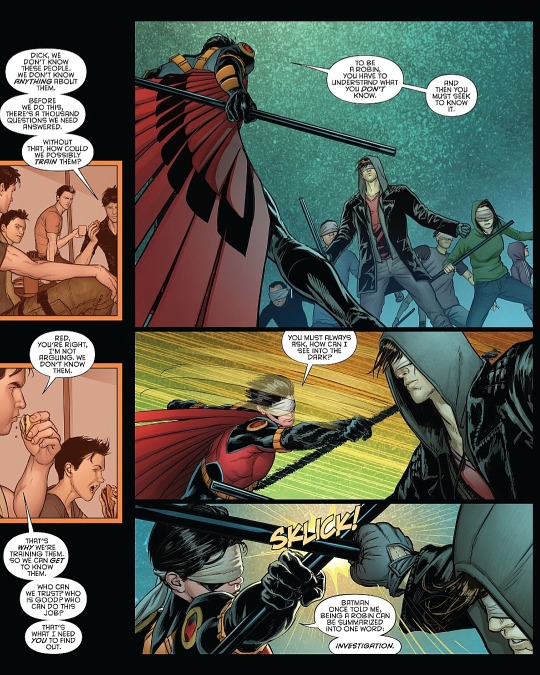
To be a Robin, you have to understand what you don't know. And then you must seek to know it. You must always ask: how can I see into the dark? Batman once told me, being a Robin can be summarized into one word: investigation.
These two were an interesting choice to pair up. I would've thought they'd put Dre with Jason, given their violent tendencies—Dre is smart, but at this point in the comics doesn't strike me as particularly investigative. Then again, right after this arc he goes undercover in a gang, so maybe he learned something?
Speaking of learning something: at first I thought they should've paired Dre with Steph (#teamcriminaldads lmao), and while that would be an interesting team, Dre did learn from Tim. If Riko were present in this issue, she would've been a good fit for Steph, as she idolizes the Batgirls and Steph was both a Batgirl and a Robin. Plus, Steph and Riko are both brave & have mean streaks, something that Riko has trouble showing because of her shyness. Steph’s advice probably would've been along the lines of “being a Robin is about defiance”.
Besides, if Tim and Dre weren't paired up, we never would've gotten this interaction.
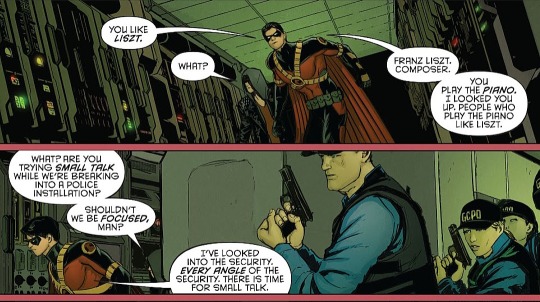
— You like Liszt.
— What?
— Franz Liszt. The composer. You play the piano. I looked you up. People who play the piano like Liszt.
Points to Tim for the most autistic small talk ever. ‘You like this, which I know because I researched you in a totally non-creepy way.’ Amazing. 10/10.
Dax gets paired with Jason. They're interesting parallels. Dax is the inventor/mechanic of the team, but also sort of the wild card with very strong morals, like Robin!Jason in a way. Like Jason, Dax’s father is (implied to be) a crook, though they took different moral directions because of that—Dax is completely opposed to gun violence.
Anyways, Jason's main reservation is that you can't have Robin without Batman. And I guess he decided to solve this issue by just becoming Batman & making the WAR crew relive his origin story by stealing tires from the mob.
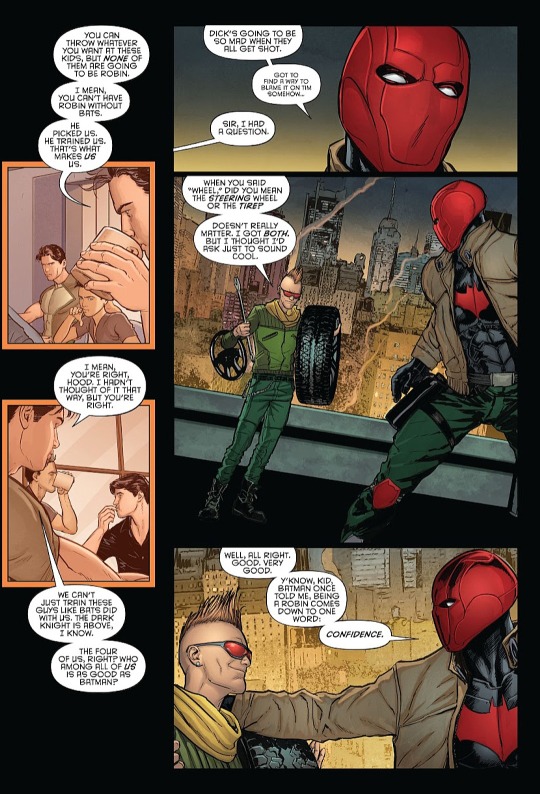
Y'know, kid, Batman once told me, being a Robin comes down to one word: confidence.
Jason Todd, the Crime Alley street kid who had the balls (and the skills) to steal Batman's tires and get away with it. Sort of. Confidence, indeed.
Damian's problem with the Robins is, of course, that they're weak, and strength (according to him) can't be trained; you either got it or you don't. He gets paired with Izzy, who probably has the toughest home life of the WAR crew. Her brother's in a gang (that he regularly beats her up for not joining), and she's failing all her classes because she's too busy working night shifts at her mom's restaurant to sleep or do homework.
So Damian's advice to her is pretty apt:
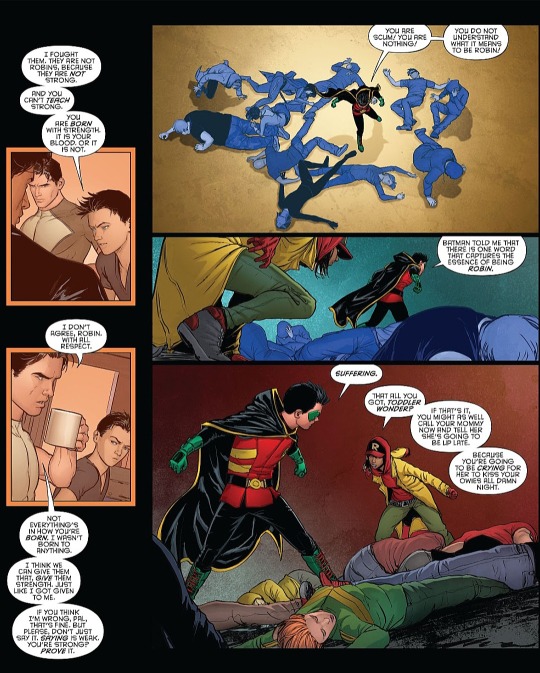
Batman told me that there is one word that captures the essence of being Robin. Suffering.
Damian and Izzy are both outwardly surly, stubborn characters who have had to fight to survive. Notably, Izzy is the first of the crew to almost resort to killing/guns (in WAR #6). She's also probably the best fighter in the WAR crew after Dre and Riko. She does dancing, gymnastics, judo, and kick-boxing.
And, finally, we reach the point of this whole post: Dick & Duke.
Duke deduces Dick's secret identity in like .5 seconds.
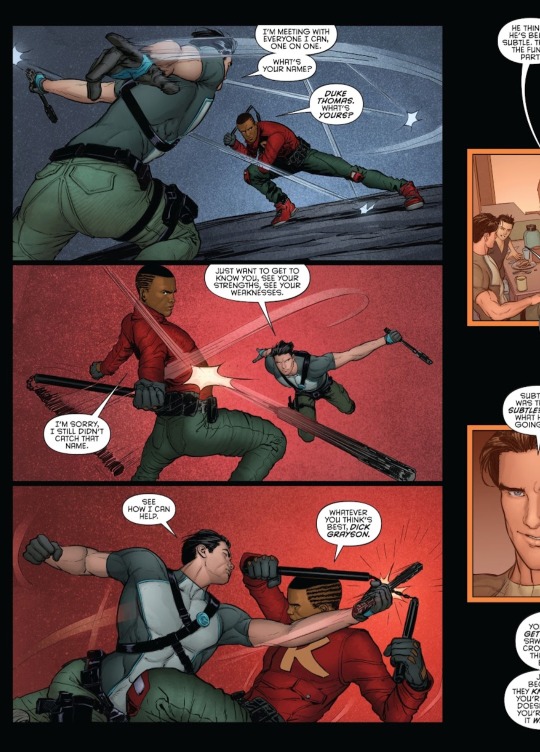
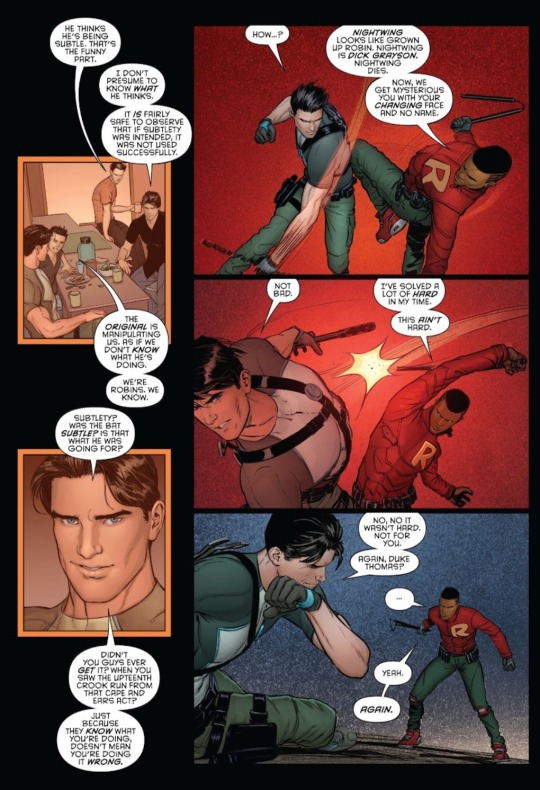
— I've solved a lot of hard in my time. This ain't hard.
— No. No, it wasn't hard. Not for you. Again, Duke Thomas?
Dick: You discovered my secret identity!
Duke: What? Like its hard?
After scoping out their strengths and weaknesses, Dick sends the Robins on individual assignments: Dre and Tim to investigate, Dax and Jason to cause a distraction, Izzy and Damian to apprehend Robo-Batman/Gordon.
Dick brings Duke on to a roof for a stake-out, where they have this exchange.
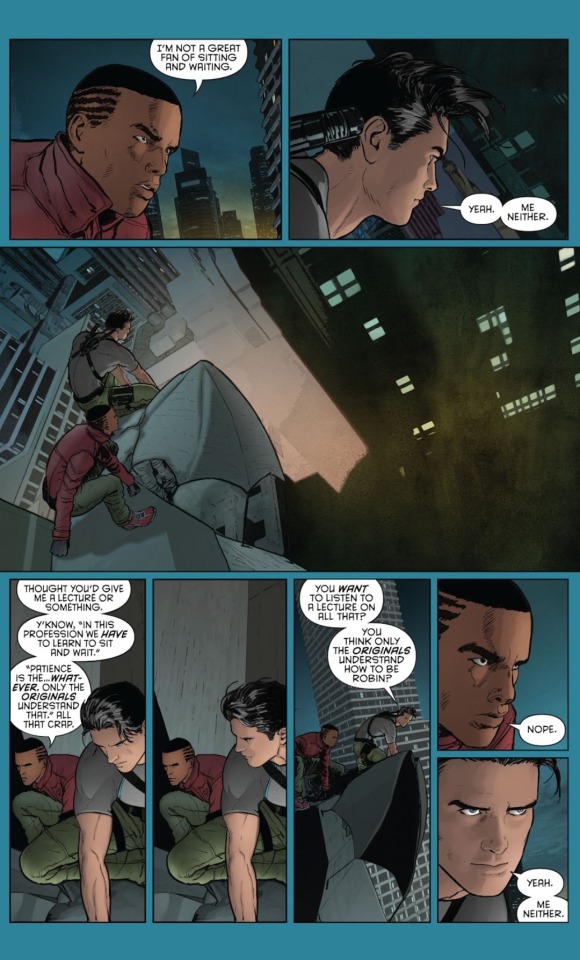
— You think only the originals understand how to be Robin?
— Nope.
— Yeah. Me neither.
Then it turns out that Dick actually turned them all in to the cops because he wanted them out of harm's way. He's been watching Duke for a while and he knows he's scared of heights, so he led him onto a roof he knew he couldn't get off of. Just before they part ways, Dick imparts his Crucial Robin Advice:
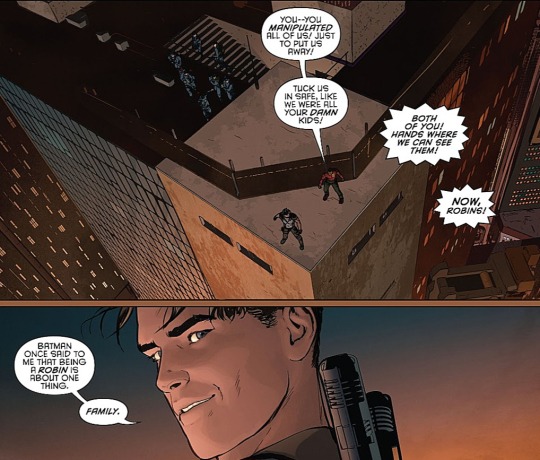
Batman once wais to me that being a Robin is about one thing. Family.
(I find this whole thing super ironic considering Dick's whole aside concerning the Robins was the fact that it doesn't matter if people know you're manipulating them as long as it works.)
The point of Robin? Family. Dick and Duke are alike in this way. Dick only became Robin to get justice for his parents’ murder. Duke only joined WAR to find his parents.
Their origins and motivations are similar, and so are the characters themselves. Dick is often called the world's second-greatest detective next to Batman himself. Duke is a child prodigy—one of our first introductions to his character is when he tried to solve the Riddler's riddles in Zero Year. He loves puzzles. He's an amazing detective.
And, of course, one of the things we know and love about Nightwing is his inherent kindness, something that's present throughout Duke’s entire character arc. Even their hero names, Signal and Nightwing, are parallels of each other (light and dark). Batman’s first sidekick and his last. And, like Nightwing, Signal formed his own team (WAR) with no help from the others (except Alfred ig).
Of course, the entire point of Signal’s character is that he's not just a Robin. He's something different. It reminds me of that post that's like—’poor dick grayson, originator of a legacy he never meant to be a legacy, crushed with guilt and jealousy when he looks at all those who came after’. To me at least, it makes sense that Nightwing’s successor would've never been a Robin at all.
#tumblr ate this post half-way thru so posting was delayed#duke thomas#we are robin#dick grayson#nightwing#dc#andre cipriani#daxton chill#dc comics#riko sheridan#batfam#izzy ortiz#damian wayne#tim drake#jason todd#Stephanie brown#robin war
334 notes
·
View notes
Text
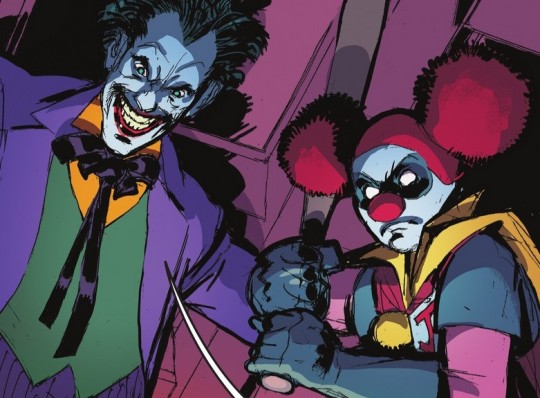
I talked about the first issue of Robin Lives! and my high hopes for it, but when #2 & 3 came around, I didn't have the time to post about them.
But this final issue… uh… Let's get into it. ("It" including gun violence and suicidal ideations.)
So as a brief recap: at the end of #3, Jason found Joker's hideout but froze when confronting him, and Joker decided to solve his Robin problem by mind-manipulating him to be a sidekick of his own: Jokey the Boy Lackey.
In #4, Joker takes his new pal to go after Dr. Stoner.
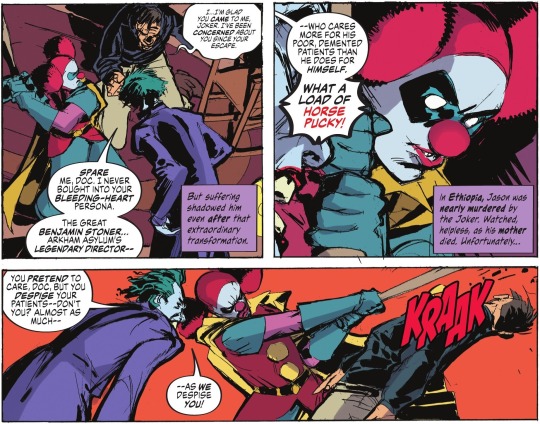
In #2, Joker pretended to be reformed but Stoner didn't buy it, expressing disappointment, which only set Joker off. And that anger reappears here, less about the offense of some nobody little man pitying him and more about insisting that nobody could actually care about the criminally insane. Of course, this scene comes off more like Joker punishing Stoner for caring— or rather, getting Jason to.
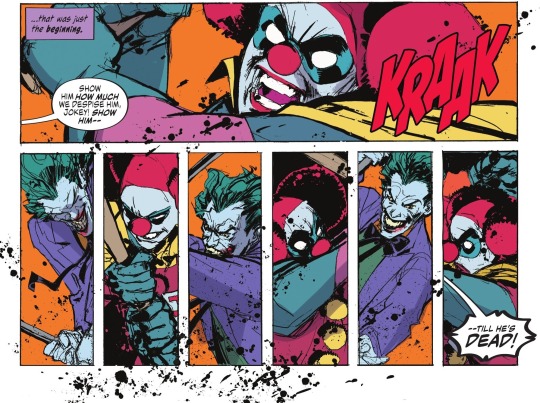
But whatever control Joker had over Jason doesn't hold.
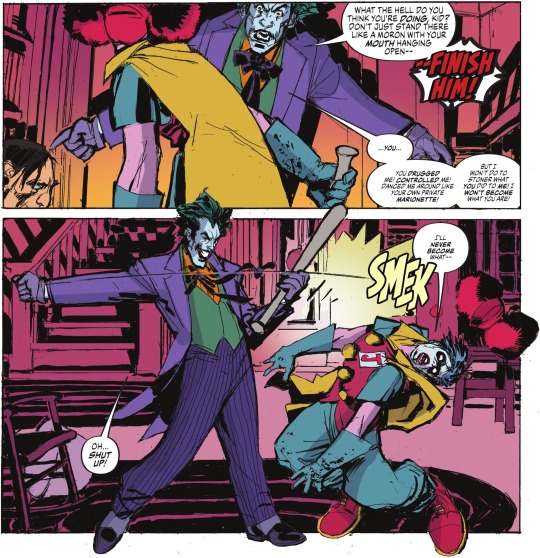
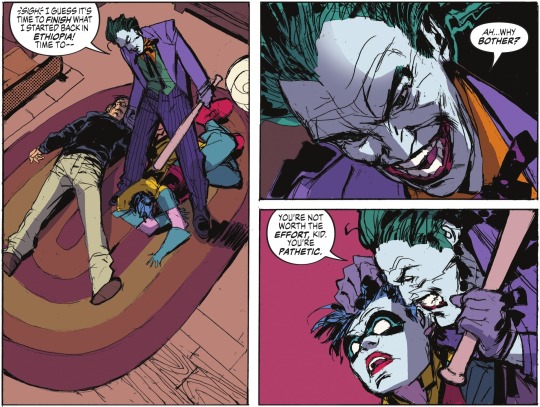
Interesting that Joker leaves Jason alive, and Stoner too. Also, Jason is still awake in this scene, so Joker is truly not worried about him.
Compare this interaction to the opening of #3, in which Joker imagines he's watching films of old comedians with Batman, who is having a great time, and that fantasy is interrupted by an imaginary Robin, who makes fun of Joker's sense of humor. Did Joker decide that since trying to kill Robin had too many downstream effects, he should try to bring him into the joke instead? And then confronted with the real Robin's disdain for him, Joker lashes out to make him feel small? In any case, Robin has proven himself a poor fit for Joker's plans, unlike Batman.
Joker returns to his hideout to get his supplies, and he leaves a note for Batman not only with a clue to his whereabouts, but explicitly letting him know that he let Robin go!
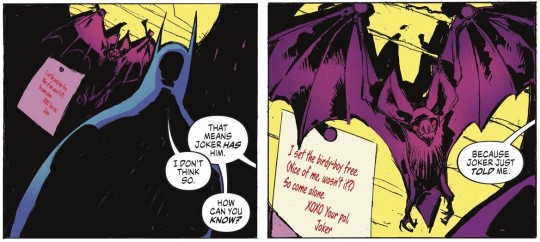
Again with the signals that Joker regrets almost changing the game. (Though he still has, considering what happened to Barbara, which is never mentioned in this miniseries, which is disappointing. In all the brooding in #2 & 3, it's not like there wasn't room for it.)
Anyway, Bruce pulls that move where he works with a sidekick just fine until it gets too dangerous.
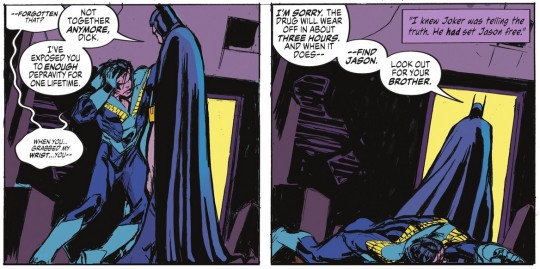
While Bruce goes to meet Joker, we learn that Jason has been stewing in humiliation and has had enough.
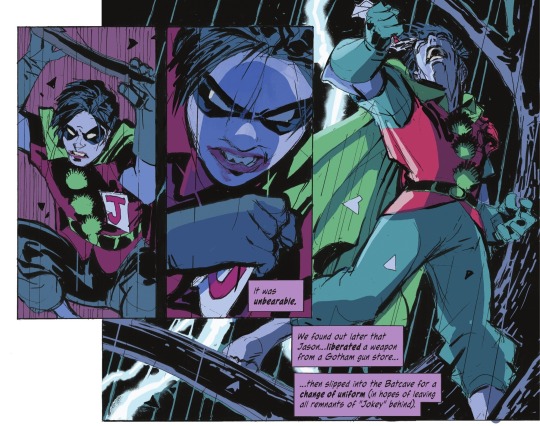
And the narration gives the first signal of how the storytelling in the last quarter of this issue is gonna go. lol

Oh, so you couldn't think of anything plausible? Anything at all? Not even, I dunno, Joker boasting to Jokey about his plan, or Jason catching sight of a map when he was in the hideout? Alright.
Anyway, Bruce finds Joker in the Miagani caves, home to the particular bat left with the note. Joker has figured out a frequency that allows him to control the bats, and he's also infected them with a psychoactive agent that he wants to unleash on Gotham.
UNLESS….
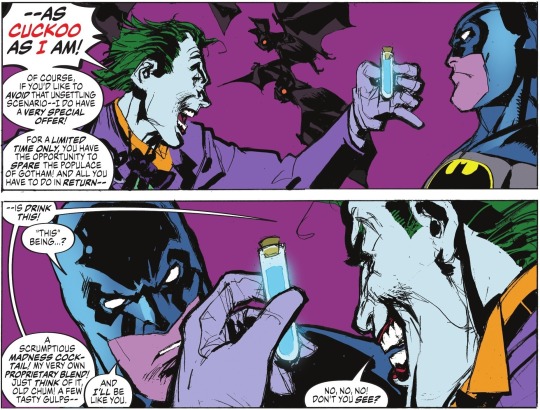
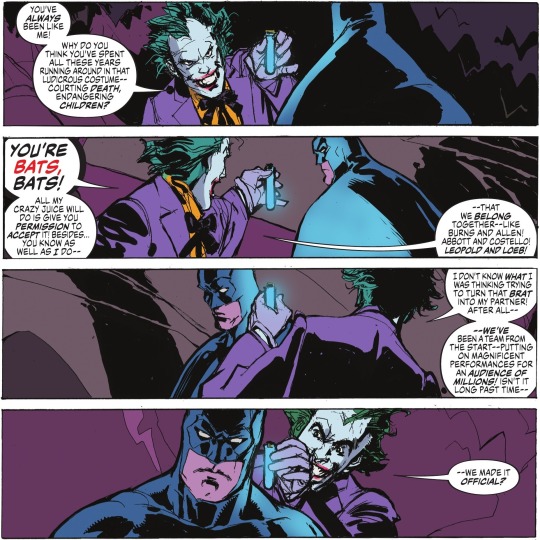
A proposal?! 😍
So it's either a swarm of infected bats or one infected Bat. Batman should forget about the dang kid, who just doesn't get the joke like they do, and join Joker!
Jason disagrees with this, which he demonstrates by popping up and shooting Joker in the chest. But we've known since #1 this doesn't end in a chest shot.
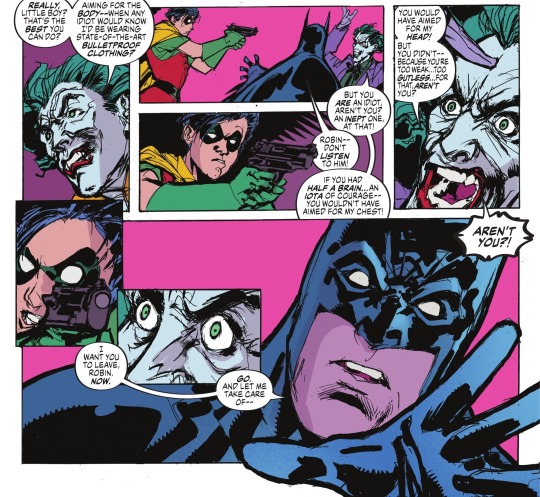
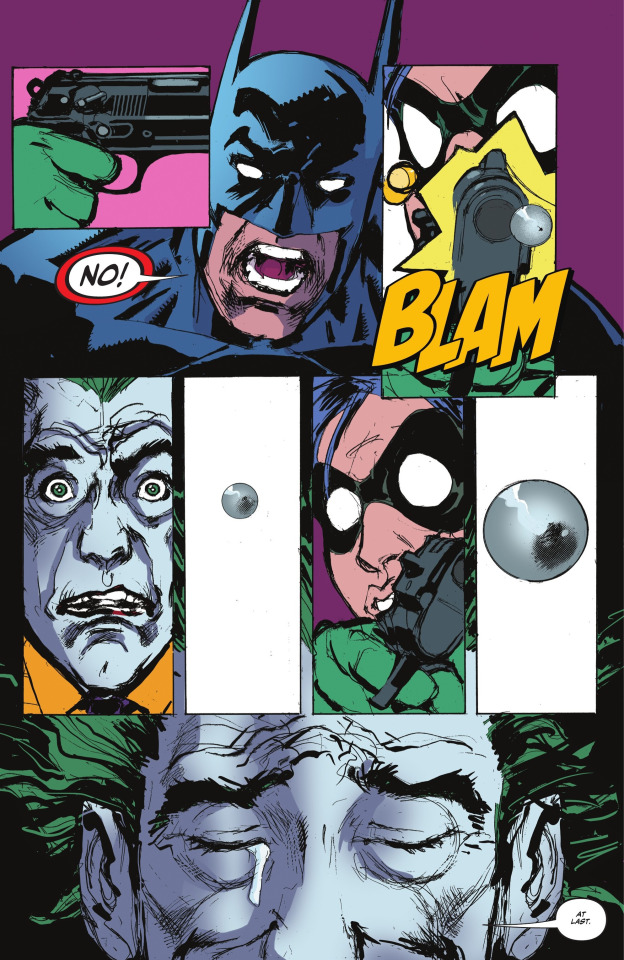
Farewell, sad clown. :(
So like Joker not planning to kill Jason, his expressions say that not only did he not expect Jason to follow through, but he was relieved when the kid did. Compare this scene to #1 when Bruce almost let him drown. Joker looked only distressed then; with Batman, he needs the game to go on. But Jason finally brings the compulsion to a stop, forever.
Bruce, of course, is upset, and he was not planning to drink Joker's toxin.
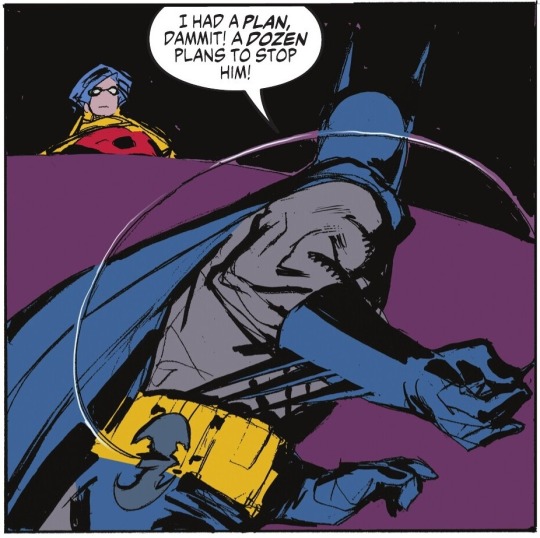
That face kills me
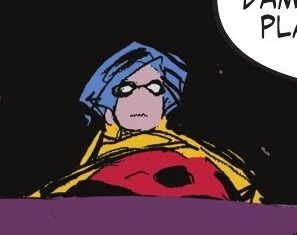
"WHATCHA GONNA DO OLD MAN"
When Bruce gets up to the ledge, Jason is gone. And while Arkhamverse Bruce nicely carried Joker's body out of Monarch Theater, here he seems to simply panic, per the first panel below. Which is quickly followed by a lot of shit that sure seems too easy??
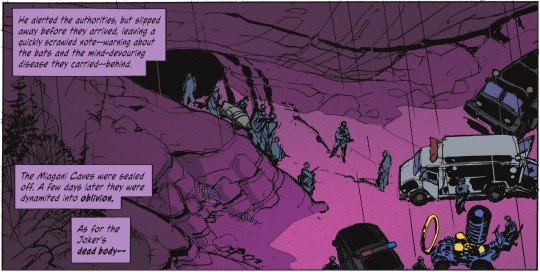
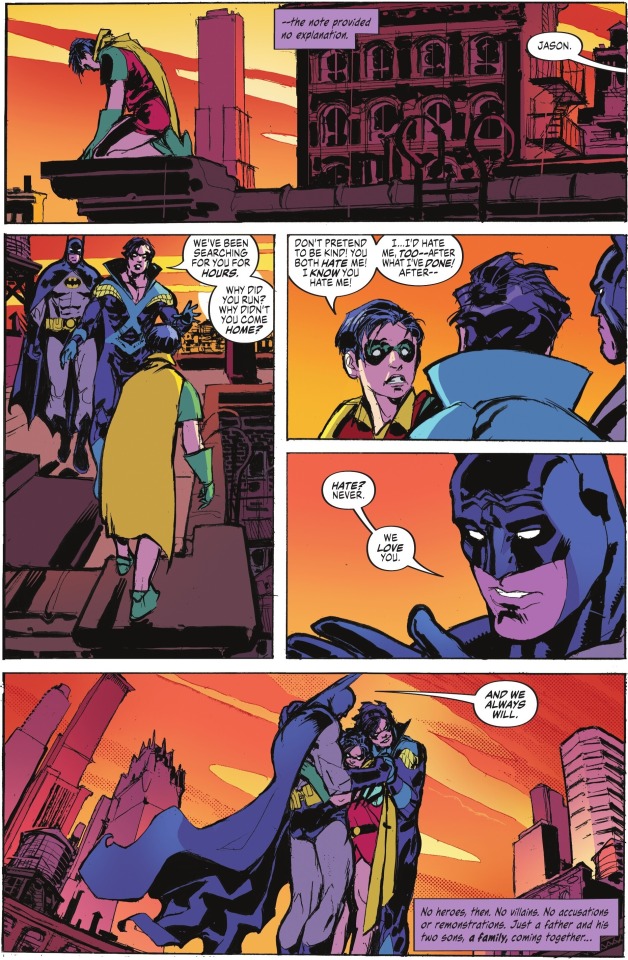
Alert, alert! 🚨 WFA has breached containment again!🚨
There are versions of this that I could buy. None of those versions have Bruce simply hugging out Joker's murder within hours of him dying.
The next three pages are an unbelievable speedrun of the aftermath. Let's go one by one.
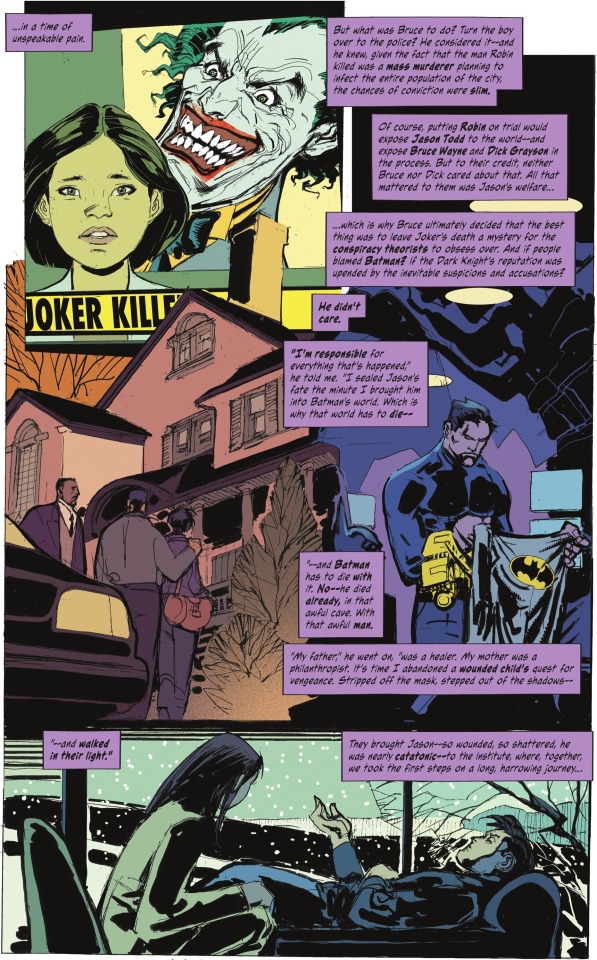
The Three Jokers-esque rundown of why Jason couldn't be held accountable for Joker's death is all fair enough. And it is in character for Bruce to take the blame for Joker's death, and boy howdy does it make the batjokes feels dance when Joker's death prompts the death of the Batman persona.
But Bruce putting all his bad bat-decisions into the dead persona doesn't really reckon with him having made all those decisions. In an earlier issue, Sara notes that Batman was a fantasy Bruce used to run away from facing his pain, and him now running into his parents' roles just feels like the same thing.
Also being told that Jason was "nearly catatonic" and not showing it is just odd.
Next page!
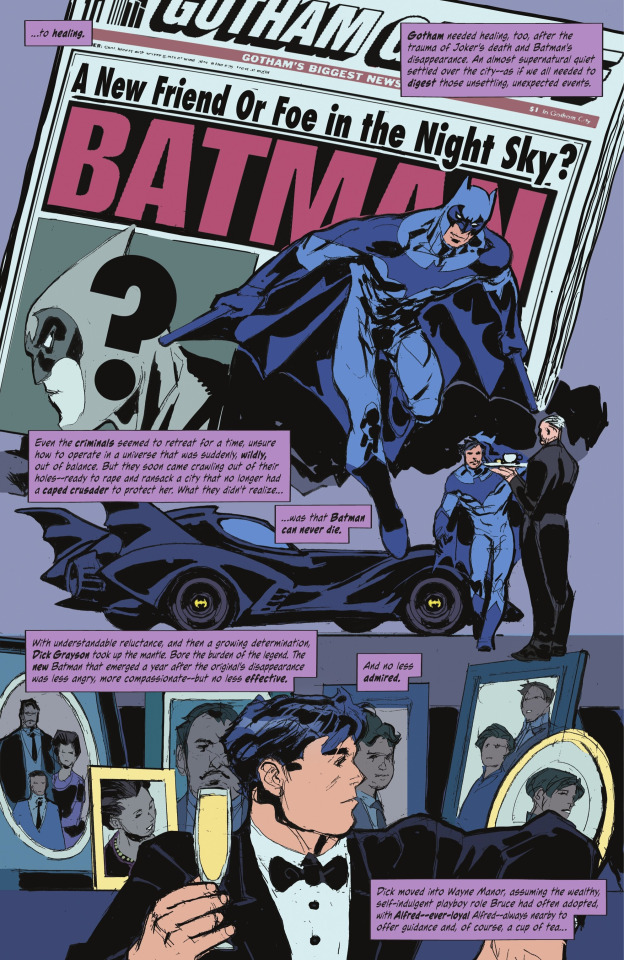
This page is also weird. I suppose if the logic is that Bruce's sin was bringing a child into the vigilante life and he needed to give up the cowl to atone… No, it's still weird, because Dick was also a child brought into that fight. Just writing him off as already damaged goods so Batman can stay around feels like it undermines the meaning of Bruce retiring.
I'm setting aside whether or not Dick would really want to be Batman, because I don't have a dog in that fight. But making him a Bruce clone does not feel right.
Maybe that's the point, though?? That the cycle is just starting all over again, inescapable? Is this just TKJ? 🤔
Before we follow that line of thinking, next page!
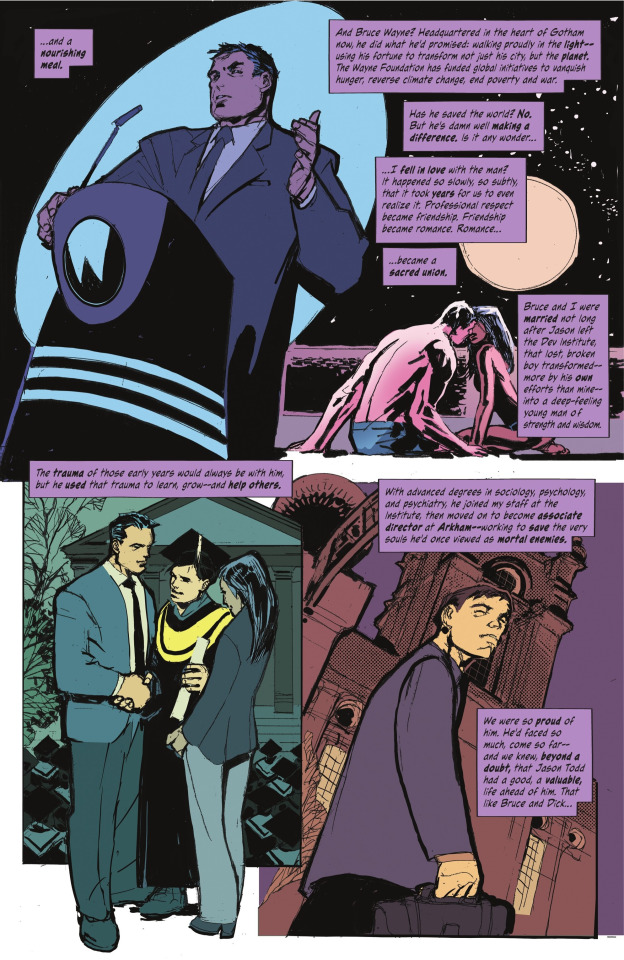
Ohhhhhhh, poor Sara. I thought you could still get out of this as a confidante. But no, you're the narrator and you're so familiar with Bruce and his family because you're ✨in love✨ now. We didn't have to do this. There's literally no point to making her a romantic interest. Sure, I can see going with her instead of an established one because they're all in the crime game and Bruce is escaping that here, but still. And don't tell me "it took years" in an attempt to gloss over how we don't even know this lady. WE DON'T KNOW THIS LADY. This development feels tacked on. I hate it.
Though I mean, Bruce only falls in love after Joker is dead. That's something. 😂
And then we have Jason getting multiple degrees related to mental health care and eventually becoming a higher up at Arkham Asylum. Way different than the Jason Todd of today, but hey, this is an alternate universe and—
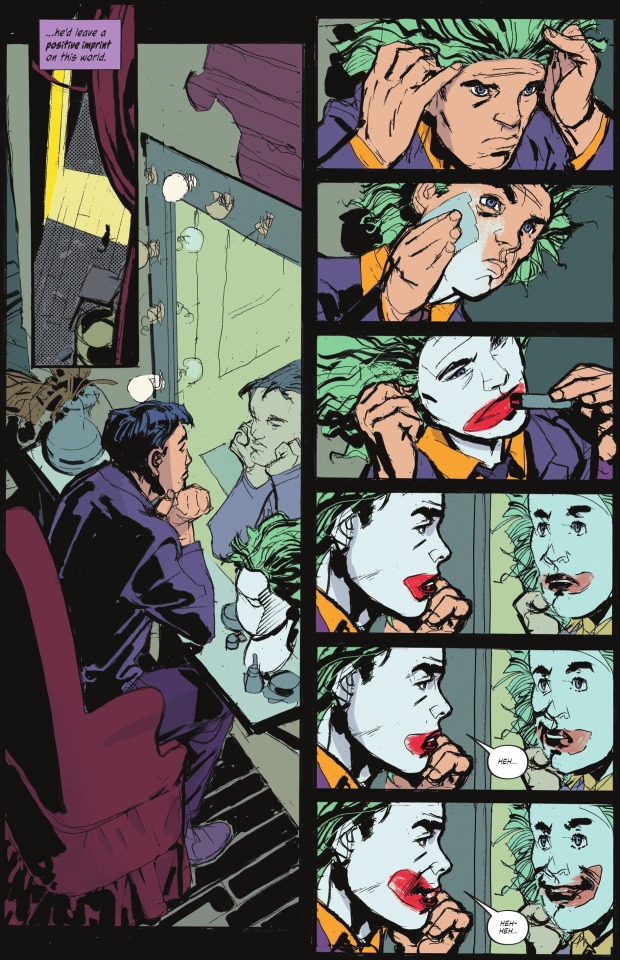
what
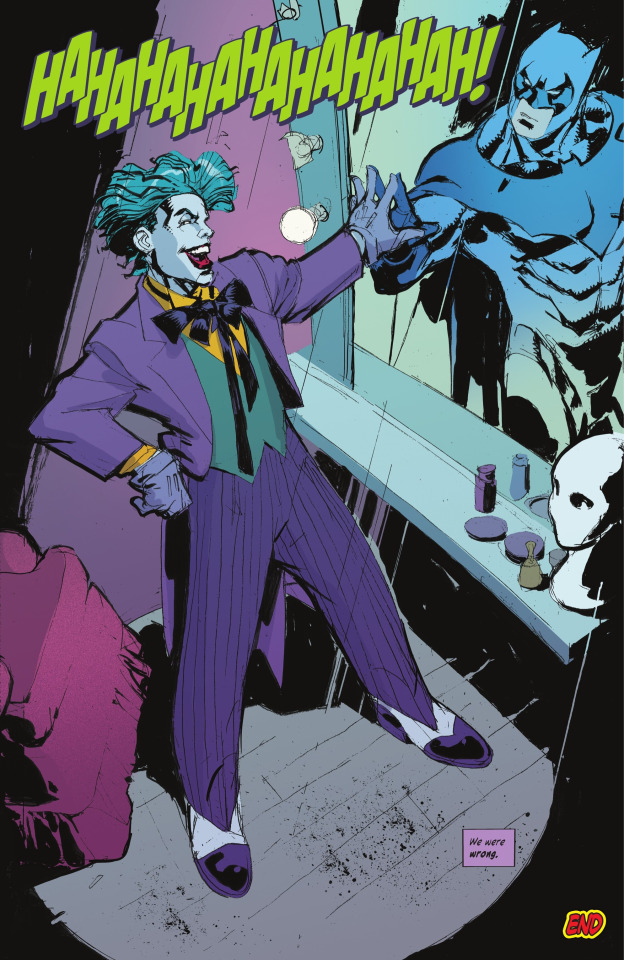
WHAT?
Uh… 🎵 Cue game show music! 🎶 Congrats to the jaydick fans out there! You are the next batjokes!
I have no idea what to think here. You could theorize that Joker's brainwashing lingered, I guess, and influenced Jason to take his place later. Or perhaps that Jason studying mental health made him ponder the Joker too much and he "infected" himself with his late tormenter? Or are Batman and Joker truly inevitable in any universe and Jason is just helplessly compelled to take on the role?
I don't know! This all was going so well and then it just ends with a bunch of stuff that happens!
I wonder if it was always supposed to end this way? I reread all the issues today, and some of the narration is strange if #4 is indicating that the Sara telling this story exists at a point where she knows that Jason is now Joker. Like some of it you read and think, "Ohhh, the inevitability here isn't about Jason shooting Joker; it's about Jason becoming Joker." But then other parts conflict with that, like in #3 when Sara talks about Jason feeling like it's impossible to victimize others, as if it's a present fact. Clearly he does not feel that way!
Also, at the end of #3 when we saw Jokey, I was excited at the prospect of Joker seeing himself in Jason, and perhaps vice versa, and the emotional struggle that direct compare/contrast could bring. And the first couple pages get at that a little, I guess? But certainly not enough that the final two pages aren't completely out of the blue.
You could say that since Jason takes on Joker's old identity as Red Hood, he's just doing the same again here, but there's still no lead-up to it!
In the end, I guess this is just a sad story about how even when Bruce breaks away from his violent coping mechanism to really promote healing, he still fucked over his kids and it's just too late? I mean, fair enough, but still. Could've used one of those big exposition pages to at least drive more at that. 🤷♀️
The next mini-series I'm pinning my hopes on is the Two-Face one in December. Christian Ward stuck the landing in City of Madness, so let's see if he can do it again!
66 notes
·
View notes
Text
little fic about tim's love language being contingency plans
////
The thing is, Tim has a way of attacking Kon’s problems like a puzzle. Like a riddle, waiting to be solved.
Tim’s plans also don’t involve much feeling, usually, even if the issue is purely an emotional one. While Tim is decent at listening and empathizing, at a certain point he always gets his Robin face on. A signal that, while he’s still certainly listening, there’s a chemical reaction in his brain, completely out of his control, that activates his detective skills. His problem-solving skills.
It has taken Kon a combined two lifetimes, four years, five collective identities, and two–maybe three?–timelines, but Kon has finally gotten Tim to at least ask before starting to strategize. But lately, Tim has undergone some personal growth, and Kon is starting to wonder if, perhaps, he has learned to not even ask. To instead, politely wait for a signal – a sign, an invitation, even– that said advice is actually wanted.
Kon would like to take the credit for training him, he really would. But he has a feeling he’s only one of many factors.
Today, Kon is sitting face-down on Tim’s bed. Krypto sits on top of Kon’s back, the world’s most powerful emotional support dog pinning him in place. Preventing him, more like, from leaving before he's gotten all his complicated, messy, unwanted feelings out. Also preventing him from looking up at his boyfriend before Kon is done feelings-dumping, because otherwise Kon just won't finish talking, and it will go unsaid.
So Kon can’t see it; he can't see the detective face for himself. Can’t verify, for sure, absolutely, 100%, that TIm’s detective face is on.
But he knows it’s there.
He’s just spent half an hour talking about his latest identity crisis. Of course Tim’s detective face is on. It’s probably been on since minute two.
However, Tim is also running his fingers through Kon’s hair, and making the occasional appropriate comment, always generous and rational and kind, always active listening, and– listen, Kon isn’t immune to the soft victim support voice. He’s definitely not immune to the Robin leader voice, but the softer, empathetic, gentle one Tim uses with people who need help? And when it bleeds in so subtly into his regular speaking voice that it’s not immediately obvious that’s where he pulling it from?
Incredible. Show-stopping. Kon could listen to it all day, if he wasn’t the one monopolizing the conversation by info-dumping all his problems.
Finally though, he finishes the garbled, soft, self-deprecating speech about how he’ll never be completely free of Lex’s braingook (yes, that is the scientific name for it, thank-you-very-much) and how that means he’s always going to have a chip on his shoulder until Lex dies and even then Kon’s going to have to worry about some secret chip in his brain that transfers Lex’s consciousness to his or what-the-fuck-ever.
He can hear the comment Tim wants to make. The unspoken, soft little, 'You know, we could probably test you for that... A chip would definitely show up on an MRI...'
Instead, Tim only pauses the briefest, softest moment. “...That must be really stressful for you, worrying about that.”
Kon looks up, just a little. Sees Tim’s best poker face.
Then sighs, and bids the victim comfort voice goodbye. “Okay, I give in,” he says, and moves to cross his arms in Tim’s lap instead. Krypto lets out an annoyed little huff at being jostled from Kon's back, but he soon hops off Kon’s back and moves to lay at his side instead. Kon rubs him behind the ears, Krypto butts his head against his hand, and all is well again. “C’mon, out with it.”
“Hm? Out with what?” Tim asks, still in the same plaintive tone. “What do you mean?”
“Relax, you can stop the sympathy. I know you want to start strategizing how to solve all my problems,” Kon says, and leans up in what he hopes is a very kissable position, because he really wants one. “You’ve suffered enough, I know you’ve already thought through eighteen different plans.”
Tim lets out a shuddering breath, immediately sagging his shoulders. “Thank you,” he says, sounding exhausted. Distracted, and clearly already thinking of how to phrase his plans, he meets Kon halfway for a kiss. It's even a proper kiss, soft and sweet, and it really does make Kon feel better. Then, to his surprise, Tim also presses a more tender one just between his brows. “I really do empathize, though. Just so you know. This isn’t me not empathizing. But I mean, if you're giving me explicit permission it's not like I haven't been starting to think about how we could test for these and help you stop worrying about them-”
Kon shakes his head, fond and sweet. “I know. Your love language is solving people’s problems for them, I've accepted this about you."
Tim looks the tiniest bit offended. "I- that's not a love language."
"It is for you," Kon says. Then, he grins, looking up at his boyfriend through his lashes. "So come on. If it's your love language... Show me you love me.”
Tim’s cheeks bloom red. But he smiles instead of shying away, then runs his fingers through Kon’s hair again, gentle and sweet. “Get comfortable then, because I’ve got a lot of- love to show. To finish the metaphor, I mean. There’s only five so far, but number three is kind of complicated, you're going to want to take notes, but I could summarize it again for you afterwards, when you're less cozy-”
Yeah, Kon thinks. There’s no denying how much Tim loves him. He might be a strategist at heart, but Tim also wouldn’t make immediate contingency plans for just anyone, either.
Kon curls up on Tim’s lap soon after, with Krypto snuggled up onto his chest. As long as Tim keeps stroking his hair, Kon doesn’t mind the clinical approach to his problems. It’s nice to have a boyfriend who can both meet him where he’s at, and say what he really feels. Even nicer, he thinks, to know that it’s all coming from a place of genuine affection.
338 notes
·
View notes
Note
For IAU requests… anything Four related? Sorry if that’s too vague lol
Don’t worry about it anon, being vague is fine! Precise prompts are fun too, but having some more vague ones adds some nice variety. And gives me the freedom to do stuff like this, hehe.
(Set when they’re all a little older. Four is somewhere in his early teens).
————————————————————
“Hey, um... Link?”
Four startled, nearly banging his head against that of the girl leaning over him. She jumped back, and Four blinked a few times, trying to focus on her face. Freckles swam into view, and Four finally recognized the girl as his friend Dot.
Friend, despite how his brothers tried to tease.
“Ah, sorry! I didn’t mean to startle you,” Dot apologized, and Four waved her off, yawning.
“‘S okay,” he mumbled, rubbing his eyes. “Did you need something?”
Dot hesitated, something odd shining in her eyes. “You um, really seem tired today, Link. Are you all right?”
No. “Yeah.”
Dot studied him a second, then leaned down, and lowered her voice so the other kids couldn’t hear her as easily.
“I... I heard your brother was in the hospital.”
Four swallowed as the familiar ache in his chest came back, and he looked at his desk as he nodded.
“I’m really sorry,” Dot continued, her voice soft. “Is there anything I can do?”
“No,” Four mumbled, not wanting to think about Twilight, still struggling to recover after a hit from a mysterious weapon had nearly killed him. Hyrule’s powers had had almost no effect on his injury, and they’d exhausted every option they had. And though Twilight was finally no longer on death’s doorstep, he still wasn’t healing like he should be.
He could easily slip back to a dangerous level, and if that happened again he might not have the strength to pull through this time.
“...Link?”
Four swallowed. “Sorry. Thanks though. Appreciate it.”
Dot hesitated, but nodded, and patted his shoulder as the bell rang, signaling the start of class. She sat in the desk next to him like she always did, and poked his arm whenever he started to drift off, giving him a light shake when that wasn’t enough.
The school day dragged on, and dragged him with it, Four fumbling his way through his classes. Dot stayed at his side for all of them that she could, and the part of him that was awake enough to notice was grateful for it.
He’d barely slept the past few days, his emotions were a wreck, and on top of all that he’d had a nasty argument with Wild last night.
“He doesn’t need this right now!”
Four swallowed. All he really wanted to do was go back to the hospital and sit with Twilight, but instead he was stuck in school, currently learning about some math formula while his and Wild’s angry words rang in his head, along with the noise Twilight had made when he’d been hit and Four couldn’t stop thinking about how still he’d gone after he’d fallen—
“Mr. Forester, I asked you a question.”
Four blinked, and realized his math teacher had come up to his desk, arms crossed as her foot tapped on the floor. The classroom was quiet, and Four swallowed when he noticed everyone was looking at him.
“Mr. Forester?” the teacher reminded sternly, and Four swallowed.
“I’m... could you repeat that, please?” he stammered, and she sighed.
“I asked if you knew how to solve the problem,” she said, raising an eyebrow. “And I would appreciate an answer sometime this year.”
A few of his classmates tittered, and Four blinked the exhaustion out of his eyes, trying to remember if he’d actually heard her say the problem or not. His cluttered brain couldn’t focus though, too many thoughts and feelings clogging his usually sharp brain. The writing on the board blurred, and Four swallowed, looking at his desk.
He had no clue what he was supposed to be solving.
“I... n-no. I’m sorry,” he whispered, and to his horror, his eyes began to water.
His teacher sighed, and went back to the front of the class. “Disappointing, Mr. Forester. I expect more from you. Can anyone else tell me how to work these equations? Miss Castor?”
Someone else spoke up, but the words just buzzed in Four’s head, his throat tight as he stared at his desk.
His brother could be dying right now, and he was wasting his time sitting in a math class.
Four bit his lip as it trembled, flipping up the hood of his jacket. The argument with Wild wouldn’t stop replaying through his mind, the way he’d yelled and how Four had yelled back, and how he’d split in the middle of it and said things he knew he’d regret, but they’d felt so good leaving his mouth, and the way Wild’s face had looked so miserable as he’d run away, and how his father had just looked resigned to the fact that they were going to lose Twilight—
A hand squeezed his arm, and Four looked through his hair at Dot, her face sharply worried now. He swallowed rather thickly, and Dot suddenly raised her hand.
“Yes, Miss Gustafson?” their teacher asked as she turned around, and Dot stood from her desk.
“I think I need to take Link to the nurse,” she said firmly, hand still holding Four’s arm. “He hasn’t been feeling well all day, you can see for yourself he’s pale.”
“Are you certain?” their teacher asked, and Dot nodded, unwavering. Their teacher thought for a moment, tapping a finger on her desk. “Hmm. I suppose he has been acting unusual today... that would certainly explain some things. You may escort him.”
“Thank you,” Dot said with a nod, and she pulled Four out of his desk and out of the classroom before he could blink.
They didn’t go to the nurse’s office though, rather Dot pulled him to a small spot behind the stairs, one so small only a few kids could actually fit back here. Four and Dot fit fine though, and she tugged Four down to sit, rifling in her bag.
“Okay, go ahead,” she said, pulling something out.
“Go ahead?” Four asked, barely stopping his voice from wobbling.
“Go ahead. Cry. You were on the verge of breaking down in there, you’ve got to let some of it out or there’s no way you’re making it through any more classes today,” Dot said matter-of-factly. She held up a small packet of tissues. “So cry, please.”
Four let out a hollow laugh. “I’m not going to just start crying because you told me to, Dot.”
“It’ll help, trust me,” Dot urged, and her voice softened. “It’s okay to be upset, Link. Anyone would be with what you’ve got going on. Just cry for a bit, and then we can go back. We don’t even have to go to the nurse if you don’t want to.”
Four laughed again, but the sound was watery. “Dot, just because Tw-Twilight is in the, the hospital, doesn’t m-mean, I...”
For some reason saying it out loud made it all crash down on him, and Four’s voice broke.
He tried to keep talking, but his breath hitched, and suddenly he was crying instead, a sob hiccuping from his throat. Dot stayed quiet as she set a hand on his shoulder, and Four felt tears begin to drip down his cheeks.
She rubbed it a little bit, and Four hiccuped again, wishing in the back of his mind that he could split. Then only a fourth of him would be sobbing his eyes out in front of Dot, and this would be a little less embarrassing.
But his powers were secret, and supposed to stay that way. So Four continued to cry, Dot scooting over to sit more closely beside him, her hand warm on his shoulder.
He didn’t know how long they sat there, Dot patting his shoulder while he cried his eyes out, but it was long enough that he was sure their teacher would be suspicious.
“Y-you should go back,” Four finally said, shakily wiping his eyes on his sleeve. “You’ll be missed.”
“Oh don’t worry about that, I can just say you threw up on me and I had to clean myself up,” she shrugged, offering him a tissue. Four let out a watery snort, but took it, shakily blowing his nose. “Or that the nurse wanted to make sure you hadn’t infected me. Ooh, or maybe you were so delirious you begged me to stay at your side, and I was forced to forgo math in order to stop your feverish ramblings.”
“No way that would work as an excuse,” Four said, his voice still wobbling.
“It might, you never know.”
Four fondly shook his head, then sighed, feeling drained from all the crying he’d just done. He didn’t feel... better, exactly, but he felt less overwhelmed by it all. His head felt less cluttered at least, and he gave Dot a grateful look.
“Thanks Dot,” he said quietly, and she nodded, then gave him a quick hug.
“Of course. If you need to talk, or just... anything else, just ask, okay?”
Four nodded, and hugged her back. “Okay.”
They sat under the stairs a little while longer, trying to make Four look like he hadn’t spent the last half hour crying, and then Dot pulled him to his feet, and they went to the nurse’s office together. They at least needed an alibi for being gone so long, and it would be suspicious if Four was never seen going to the nurse. Even if he only felt sick because of worry.
Four sighed as they walked down the hallways, and Dot squeezed his hand, giving him a little smile. He somewhat succeeded in returning it, and his thoughts drifted back to Wild, and their argument.
As soon as he made it through the rest of the school day, he’d... try and talk to him. He owed Wild that much at least.
And... Twilight would want him to try.
#IAU sunset arc babey#linkeduniverse#linked universe#incredibles au#Incredibles au fic#lu four#lu Dot#answers from the floor#anon#fic#writing from the floor#twilight’s fine obviously but it sure sends his family into a tizzy#it’s fun figuring out how things would change for this au#fun times. hehe.
128 notes
·
View notes
Text
READ THIS BEFORE INTERACTING
Alright, I know I said I wasn't going to touch this topic again, but my inbox is filling up with asks from people who clearly didn't read everything I said, so I'm making a pinned post to explain my stance on AI in full, but especially in the context of disability. Read this post in its entirety before interacting with me on this topic, lest you make a fool of yourself.
AI Doesn't Steal
Before I address people's misinterpretations of what I've said, there is something I need to preface with. The overwhelming majority of AI discourse on social media is argued based on a faulty premise: that generative AI models "steal" from artists. There are several problems with this premise. The first and most important one is that this simply isn't how AI works. Contrary to popular misinformation, generative AI does not simply take pieces of existing works and paste them together to produce its output. Not a single byte of pre-existing material is stored anywhere in an AI's system. What's really going on is honestly a lot more sinister.
How It Actually Works
In reality, AI models are made by initializing and then training something called a neural network. Initializing the network simply consists of setting up a multitude of nodes arranged in "layers," with each node in each layer being connected to every node in the next layer. When prompted with input, a neural network will propagate the input data through itself, layer by layer, transforming it along the way until the final layer yields the network's output. This is directly based on the way organic nervous systems work, hence the name "neural network." The process of training a network consists of giving it an example prompt, comparing the resulting output with an expected correct answer, and tweaking the strengths of the network's connections so that its output is closer to what is expected. This is repeated until the network can adequately provide output for all prompts. This is exactly how your brain learns; upon detecting stimuli, neurons will propagate signals from one to the next in order to enact a response, and the connections between those neurons will be adjusted based on how close the outcome was to whatever was anticipated. In the case of both organic and artificial neural networks, you'll notice that no part of the process involves directly storing anything that was shown to it. It is possible, especially in the case of organic brains, for a neural network to be configured such that it can produce a decently close approximation of something it was trained on; however, it is crucial to note that this behavior is extremely undesirable in generative AI, since that would just be using a wasteful amount of computational resources for a very simple task. It's called "overfitting" in this context, and it's avoided like the plague.
The sinister part lies in where the training data comes from. Companies which make generative AI models are held to a very low standard of accountability when it comes to sourcing and handling training data, and it shows. These companies usually just scrape data from the internet indiscriminately, which inevitably results in the collection of people's personal information. This sensitive data is not kept very secure once it's been scraped and placed in easy-to-parse centralized databases. Fortunately, these issues could be solved with the most basic of regulations. The only reason we haven't already solved them is because people are demonizing the products rather than the companies behind them. Getting up in arms over a type of computer program does nothing, and this diversion is being taken advantage of by bad actors, who could be rendered impotent with basic accountability. Other issues surrounding AI are exactly the same way. For example, attempts to replace artists in their jobs are the result of under-regulated businesses and weak worker's rights protections, and we're already seeing very promising efforts to combat this just by holding the bad actors accountable. Generative AI is a tool, not an agent, and the sooner people realize this, the sooner and more effectively they can combat its abuse.
Y'all Are Being Snobs
Now I've debunked the idea that generative AI just pastes together pieces of existing works. But what if that were how it worked? Putting together pieces of existing works... hmm, why does that sound familiar? Ah, yes, because it is, verbatim, the definition of collage. For over a century, collage has been recognized as a perfectly valid art form, and not plagiarism. Furthermore, in collage, crediting sources is not viewed as a requirement, only a courtesy. Therefore, if generative AI worked how most people think it works, it would simply be a form of collage. Not theft.
Some might not be satisfied with that reasoning. Some may claim that AI cannot be artistic because the AI has no intent, no creative vision, and nothing to express. There is a metaphysical argument to be made against this, but I won't bother making it. I don't need to, because the AI is not the artist. Maybe someday an artificial general intelligence could have the autonomy and ostensible sentience to make art on its own, but such things are mere science fiction in the present day. Currently, generative AI completely lacks autonomy—it is only capable of making whatever it is told to, as accurate to the prompt as it can manage. Generative AI is a tool. A sculpture made by 3D printing a digital model is no less a sculpture just because an automatic machine gave it physical form. An artist designed the sculpture, and used a tool to make it real. Likewise, a digital artist is completely valid in having an AI realize the image they designed.
Some may claim that AI isn't artistic because it doesn't require effort. By that logic, photography isn't art, since all you do is point a camera at something that already looks nice, fiddle with some dials, and press a button. This argument has never been anything more than snobbish gatekeeping, and I won't entertain it any further. All art is art. Besides, getting an AI to make something that looks how you want can be quite the ordeal, involving a great amount of trial and error. I don't speak from experience on that, but you've probably seen what AI image generators' first drafts tend to look like.
AI art is art.
Disability and Accessibility
Now that that's out of the way, I can finally move on to clarifying what people keep misinterpreting.
I Never Said That
First of all, despite what people keep claiming, I have never said that disabled people need AI in order to make art. In fact, I specifically said the opposite several times. What I have said is that AI can better enable some people to make the art they want to in the way they want to. Second of all, also despite what people keep claiming, I never said that AI is anyone's only option. Again, I specifically said the opposite multiple times. I am well aware that there are myriad tools available to aid the physically disabled in all manner of artistic pursuits. What I have argued is that AI is just as valid a tool as those other, longer-established ones.
In case anyone doubts me, here are all the posts I made in the discussion in question: Reblog chain 1 Reblog chain 2 Reblog chain 3 Reblog chain 4 Potentially relevant ask
I acknowledge that some of my earlier responses in that conversation were poorly worded and could potentially lead to a little confusion. However, I ended up clarifying everything so many times that the only good faith explanation I can think of for these wild misinterpretations is that people were seeing my arguments largely out of context. Now, though, I don't want to see any more straw men around here. You have no excuse, there's a convenient list of links to everything I said. As of posting this, I will ridicule anyone who ignores it and sends more hate mail. You have no one to blame but yourself for your poor reading comprehension.
What Prompted Me to Start Arguing in the First Place
There is one more thing that people kept misinterpreting, and it saddens me far more than anything else in this situation. It was sort of a culmination of both the things I already mentioned. Several people, notably including the one I was arguing with, have insisted that I'm trying to talk over physically disabled people.
Read the posts again. Notice how the original post was speaking for "everyone" in saying that AI isn't helpful. It doesn't take clairvoyance to realize that someone will find it helpful. That someone was being spoken over, before I ever said a word.
So I stepped in, and tried to oppose the OP on their universal claim. Lo and behold, they ended up saying that I'm the one talking over people.
Along the way, people started posting straight-up inspiration porn.
I hope you can understand where my uncharacteristic hostility came from in that argument.
161 notes
·
View notes
Text
Despite Fear
Final Outer Wilds + Echoes of the Eye Liveblog | Spoilers Below
So, I've done it! After 49.3 hours in the game, I've finally completed base and dlc of Outer Wilds, but I'm getting ahead of myself
Last we left off in the game, I had completed Canyon and Shrouded- with only Starlit and the Prison itself left. I also learned how to consistently no-clip underneath the map within the simulation, cool!
So, lets talk about Starlit!
I'm thoroughly traumatized! I've made it pretty clear with all my whining in the previous liveblogs, but I'm TERRIBLE at spooks, it messes with my anxiety so badly and I generally just avoid anything horror because of it. So--- having to stealth past and sidestep the strangers (EVEN ON REDUCED SPOOKS) made my experience. not good!!!!!
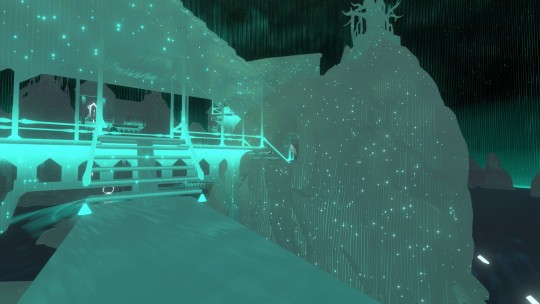

No amount of debug surveying helped mentally either, but at least I could scout out the stranger's routes easier. This helped when I had to go into the downstairs room past the initial alarm bell and plan out how to avoid the two strangers guarding the bridge (that was terrible btw)
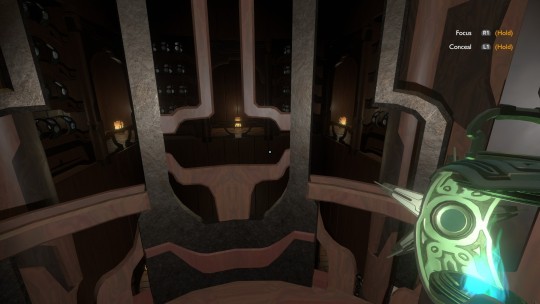
either way. after pausing so many times, hyperventilating through dealing with the strangers, and throwing myself down ledges or into the water out of fear- I DID IT!!!!! I DID ITTTTT I GOT THROUGH STARLIT AND IT SUCKED SO BAD!!!!!!!!! IT SUCKED SO SO BAD!!!!!!!!! I HATED IT!!!!!!!!!!! BUT I DID IT!!!!!!!!! OH MY GODDDDDDD!!!!!!!!


AND OFC THE CODE IS ALSO BURNED HERE WHY AM I NOT SURPRISED
BUT WHO CARESSS!!!!!!!! LORE TIME BABY!!!!!!!!!!


So, out of fear- the Strangers suppressed the Eye of The Universe. I guess that's one way of dealing with it.

Also- being dead means the alarm bells don't work. I already knew that the alarm bells didn't work on the Strangers, but having it laid out in front of me was very helpful
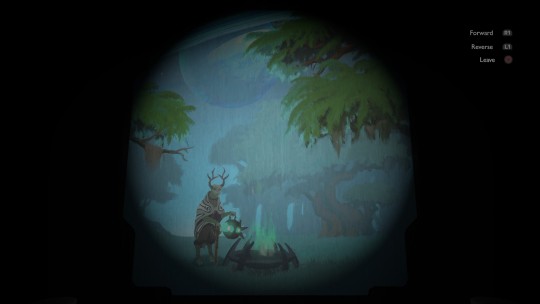
also dying in front of the fire still means you get into the simulation (also look how cute that old stranger is!!! their little :o is so cuteeee!!!!)
So, Starlit's completed, meaning I only had one thing left to do, the prison!
I mentioned this last time, but I did accidentally discover the area wayyy early- but never could replicate the no-clip until the Shrouded Archive. I also didn't know what the area was or what to do with it, so most of the info I got besides the prison being there went over my head entirely.
But now I was there intentionally!! With the context I needed!! And wow, the way to open it was right there all along, especially for shrouded haha- they literally just give it to you for no-clipping (makes sense considering that's where you learn about it).
As for the puzzles for Canyon and Starlit, I figured out Canyon's really quickly while I struggled a bit with Starlit's. Though the moment I started following the thought line of being dead = circumventing the alarms- it was easy to figure it out. And man, was it fun seeing hatchling stand up in the simulation after collapsing!!! I can imagine a few people have discovered that by accident and the confusion they must've had haha.
Also, because being dead circumvents the alarm bells- couldn't someone have solved Starlit by just.. being dead? and not having to turn off the lights to circumvent the alarms or introduce the strangers into the map? Unless there are doors downstairs that would've been locked if the lights were on. Idk, just a thought.
Either way, the prison!


I was terrified the entire way down, that tiny hallway is EVIL dude. Absolutely evil- and the lone artifact being set down- telling you that there's someone else there??? fucking diabolical.
Regardless-

Friend!!! Friend!!!!! Oh my gosh!!!!! Friend!!!!!!! Their curious blinks!!! oh!!!! oh!!!!!!!!! friend <3 Friend!! <3 Friend <3!!!!!
I love how we were able to communicate with the staff!!! It was so cool!! But also- the poor guy got locked up for eternity, all for releasing the signal for the eye for a couple of moments. That's terrible, my heart broke seeing their sad face :((
But then Hatchling's slides started playing. The music. The music. guys (shaking you). the music. the music. i cried. i sobbed. i bawled even. the music. the music. oh my god im crying even now. the story of the nomai. feldspar. seeing hatchy ourselves. Our story.
The prisoner's actions- despite their terrible punishment, despite the strangers' retaliation towards them out of fear... it was worth everything because those couple of seconds where they released the signal altered the course of the Nomai and the Hearthians. They did this despite fear and it meant everything.
Y'know. I was completely wrong with my theory of the prisoner being a bank of knowledge or a power source for the simulation, i got really caught up with the themes of escapism that the theme of fear completely went over my head. but, it makes so much sense that its so. The strangers were so afraid, everything in the dlc ties to being afraid; afraid of the truth, of the eye, of death, of facing loss, etc etc. The prisoner being locked up didn't need to have some sort of rationale or some greater purpose in escapism; the truth is that the strangers were scared, and that's all the reason that this story needed.
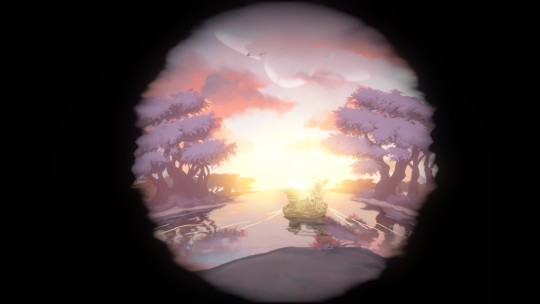
I love this story. And I love that the prisoner was able to find peace, and let go in the end, as heartbreaking as it was seeing those footsteps in the sand.
Also, if I had a nickel every time a character that meant a lot to me died/implied to have died through water and left a symbol of themselves embedded into the sand, I would have two nickels.
So, after following the footsteps and getting the title card for the DLC, I reset the universe.
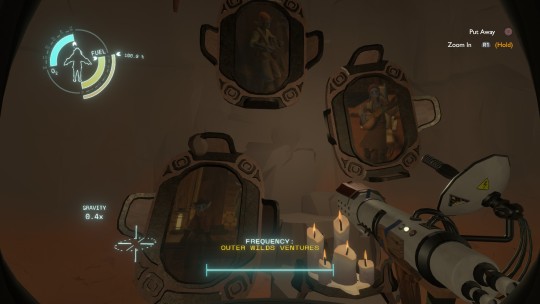
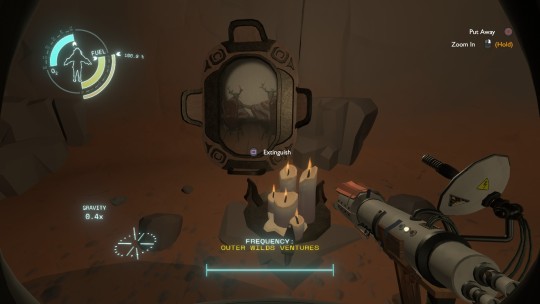

Seeing Prisoner's additions to the ending made me want to bawl. It's all of us <3 How sweet that the knowledge we gave them meant so much that they included the Hearthians and the Nomai. I didn't mind the jump scare either with the mirror, I was weirdly unafraid with that one haha.

And ouhg.. the poor baby- I had to invite them to join us :,( This poor poor baby- of course I want to remember you.
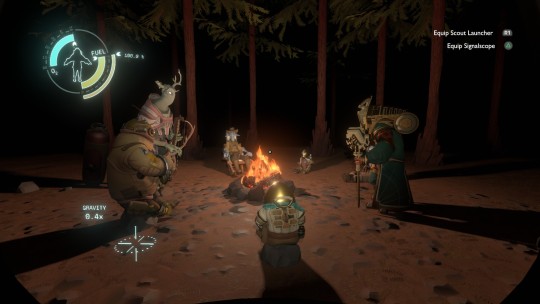

Gosh they mean everything to me.
And the Prisoner's addition to the song?? Oh, absolutely wonderful. I love the theremin- it fit right in.

And there they are <3
Thank you to everyone whose read my blogs, whether they've kept up with them all or only read one or two, it means a lot and I'm glad to have shared this journey with all of you!
And thanks to my friends @aetergator , @jasminerice00 , and my friend Wren for accompanying me throughout it. It made the journey much less frightening and gave me all the more reasons to keep going despite my fear.
I love this game, 10/10.
12 notes
·
View notes
Text
Soulmates, AU!
The one where you get the words the person first tells you written on your skin on your birthday. The twist, it only lasts until you find that person so it can vary between a few hours and several months or years.
There's literally many selfies every day on the internet, with people displaying their soulmark in various degrees of concealment, just to keep record. From one word stamped on their forearm to long sentences or paragraphs.
It's what is keeping Katsuki in his room on his f*cking birthday. He refuses to leave the room. He has already spoken with Aizawa and sent messages to his friends so they could stay away from him, at least until it got solved, which he expected to happen in the next few hours of the day
He knows his case is probably a rare one, but he will not become a viral meme, nor will he allow anyone to make fun of him. He even called his parents to get the congratulations over with as soon as possible and made clear he wasn't going to dinner due to his current problem, though he mentioned that if it was solved quickly he might consider it.
Thank god he had bathed the previous night or he could have spent all day in the bathroom instead if he had gone straight there as he usually did, scrubbing at his skin trying to remove the words and knowing there was only one person who could rid him of this misery.
Because as soon as he woke up that morning, aware of what was supposed to happen, he knew he was in trouble. With bleary eyes still heavy with sleep, he noticed words on his left arm, but when he used his right hand to trace them, he noticed that one too was covered in words. Suddenly, he was very much awake. He saw the letters extending over both arms, and when he lifted his t-shirt, he saw them too.
He ran towards the mirror inside his closet and found his face also covered in scribbling, going down to his neck, and when he turned, it was also around his back!
Exasperated already, he slid his hands over his face, knowing exactly who would be connected to this. He tried to read the words using a smaller mirror that he usually had with him for multiple purposes and caught many interesting details about soulmarks and soulmates... well, at least it wasn't going to last for too long.
After learning that, he had purposefully not sent a message to Izuku, he knew the green haired boy was going to find an excuse to come find him as soon as he heard from this and would probably come and help him without being aware that he was the key to free him.
It didn't take that much time, considering it was lunch time by the time he heard knocking on his door. The worried voice of his longest acquaintance, past friend, turned rival, and apparently soulmate could be heard asking silly questions and sounding as if he wanted to spare him the embarrassment, how ironic.
He responded in short sentences and tried to act as his usual grumpy self, which was not too difficult, but he had to admit it was accompanied by a small level of fondness by now. So he cut it short and asked the other. What did he know about soulmates that could be helpful?
As expected, Izuku started to ramble, muttering away what he knew about the topic and going on tangents that made him shiver as if he could feel each word tingling on his skin as they were being spoken.
He had been able to read the last couple of words along with Izuku. They ended right above his navel so he could read them right and noticed how Izuku fell silent when he pronounced them. Sighing in defeat, he finally opened the door. The words were going to fade anyway once Izuku saw them, so better make it quick.
He was not expecting Izuku to snap a picture the moment he did, but it was okay. The look of surprise in his green eyes was worth the smirk on his face as he noticed the words dissolving on his skin like water, he rolled his eyes and signaling the other boy to enter his room, they needed to talk anyway.
#fanfic#mha#bnha#mha deku#mha bakugou#bnha deku#izuku midoriya#bnha bakugou#bakugo katuski#bkdk#soulmates au#muttering midoriya#katsuki is an open book#almost literally#soulmarks
21 notes
·
View notes
Text
Hiya Papaya! 👋
Someone online (I actually forgot who it was though and cannot find the message anymore) recommended to me Haibane Renmei with the quick summary of "It’s about a sort of afterlife where haibane need to figure out what to do to ascend.". I decided to give it a go, which was a good decision! I can really recommend you to watch it too! It's even better if you do that and then come back to this post and read the rest. However, I felt like this anime is not about "ascending" or "reincarnation". Personally, it's about moving forward with your life. (Spoiler warning obviously and I should mention that I have no clue about psychology and english isn't my first language, so I could confuse some phrasings.)
If you didn't watch it, let me clarify some small things:
There are angel-like people called the Haibane, born from cocoons, who cannot remember anything except for the dream they had just before.
The walls encase a town called Glie and some landscape with buildings (e.g. Old Home), forests and many plots of land
Nobody is allowed to touch the wall (or go even near it) or go behind the wall except the Toga and animals like birds (e.g. Crows which play a big role)
An organization called the Haibane Renmei takes care of the Haibane and their head is the communicator.
Being Sin-Bound means that a Haibane didn't have a dream and don't get their Day of Flight.
I'll also try to write this essay chronologically, so along what we learn in each episode.
So let's talk about my view on what story the anime is trying to tell. I believe Haibane Renmei talks about being able to take a step towards the future.
In episode 1 we learn that the one and only thing that the haibane remember is the dream they had before waking up in a cocoon, for example: falling, being surrounded by sparkling light, getting run over by a train or just sleeping. You can either interpret this as how they died or their plan to end their lives. In my opinion, it's the latter one because it makes more sense why they arrive in Glie and inside the walls separating the town from the outside world. We'll talk about it at a later point. So, the Cocoon represents coming out of their shell and getting help on their own. That's why it's a custom that one should break out of their own cocoon. It's like the haibane has regained their will to live and tries to improve their lives by getting help. Which is quite a tough thing to do. The part where a haibane doesn't remember anything besides the dream and getting a new name could be seen as a metaphor for restarting from zero and leaving the regrets (or anything similar) behind.
During episode 2 we also learn that there are not just angel-like Haibane in Glie, but instead they are allowed to stay by the normal people living there. The townsfolk are really nice people too, so I think these people personify a safe space where the Haibane can work and get back into a rhythm and normalcy. Additionally, in episode 4, Kana also mentions that the town is extremely protective of them, further strengthening this argument. This idea of Glie as a safe space is also represented by the communicator, who helps the Haibane and has them live in a controlled space so they can focus more on moving forward.
The next big thing that happens in this anime is Kuu having her Day of Flight (episode 6). I believe that this event is a signal that the Haibane has finally "solved"/worked out their problem and broke free of it. From my point of view, it seemed like Kuu figured out that she doesn't need to be like everybody else. The first clothing item she bought was a jacket in a larger size, the size of the other girls. She also tried to be like them by wearing Hikari's glasses or riding Reki's scooter. However, Kuu said to Rakka "You gave me some of the drops, Rakka.". Drops were filling a cup (in her mind) and it got completely full. On that same day, Kuu had her Day of Flight. In episode 3, Kuu said that she hoped that Rakka would be a little sister and seemed happy when Rakka called her senior. I think that made her realize that she doesn't need to be like everyone else; she can be herself and still be a senior. Kana also confirmed that in episode 6 by saying that "I think she no longer has to pretend to be what she isn't anymore." and "[...] but maybe she's grown up in her own way.". Meaning she's able to move forward towards the future. Having her Day of Flight. After Kuu had left, the only thing that remained was a few feathers and her halo. This can be a metaphor for stripping off that feeling that she's not like others. Like she's regained her humanity and not feel alienated.
Sadly, Rakka couldn't get over Kuu leaving and is in a really depressed state (episode 7). So much so that black spots appeared on her wings, which Reki recognized. This is where we learn about being sin-bound. (Note: I'm jumping between the crow and sin-bound themes since both of them are deeply connected) I think that being sin-bound signals someone that has given up or is about to. In episode 8, Rakka is led by crows to a well to meet someone. That someone is a skeleton of a crow. However, she recognizes the bird by saying "You've taken the form of a bird now, but it feels like I had known you from somewhere, a long time ago.". Furthermore, she adds "I can't even remember my name. [...] So I can't remember who you are. Except that you're somebody precious to me. I was always lonely. And I thought nobody would grieve, even if I was gone. So I wanted to disappear. But you were by my side. You became a bird to go over the walls and let me know that I was not alone." These sentences give us a lot of information. She wants to disappear. She even thought/dreamed "My existence should be erased from the world.", when she was unconscious in the well. Due to her feeling lonely, she thought that she didn't belong in this world. That's why it hit her so hard when Kuu left.
The crows play a huge role in the anime too. In episode 4, Kana said these things about the crows "They're said to carry lost items.", "Things we left behind and forgot when we went into the cocoons." and Kuu also talked with Rakka about them in episode 3 "But I think they want to be friends with us.". It seems to me that the crows represent someone or something that is connected to past regrets/problems. But instead of being hurtful, they're trying to help so that the Haibane can be free again. Free from being sin-bound. That is why the crows led Rakka to the well. This thesis is further proven by the fact that Rakka wants to return to her dream and apologize to the crow (episode 9), which is directly followed by the communicator saying "One who recognizes their own sin, has no sin." Side note: They also talk about sin-bound itself, that "Perhaps that is what it means to be bound by sin. To keep going around in the same circle looking to find where the sin lies and at some point losing the sight of the way out." When Rakka got back to Old Home, Reki noticed that the black spots were completely gone. Meaning that Rakka is no longer sin-bound and has let go of her past regrets, she actually confirms this at the end of the episode too.
Speaking of Reki, she's another sin-bound. That's the reason why she knew so much and was able to help Rakka this often. Since Rakka has recovered, she and the communicator got to have a talk in episode 11 about Reki. There she learns that "She is still lost in the dark. Rakka, you had the bird come to you enabling you to fill in the missing pieces of your memories. However, Reki has no one. She must face the darkness in her mind, on her own." From what we learn throughout the last 3 episodes, I'm positive that Reki's regret is similar, if not the same as Rakka's regret. Reki is alone but, in contrast to Rakka, she felt betrayed by everyone "Every time I trusted someone, I always ended up being betrayed." (episode 13) because everyone leaves her side. When Kuu had her Day of Flight, she said to herself "In the end, everybody leaves me.", just like when Kuramori (a Haibane who took care of her) was gone or she and Hyouko (a Haibane from the Abandoned Factory nest) weren't allowed to go to each other's district. She was afraid to hurt somebody she trusts and get hurt by them. As a result, she stopped trusting everybody and became a "stone" by closing her heart (episode 13). Even Rakka noticed that in episode 11 "Because she doesn't want to worry anyone and because she doesn't want to lean on anyone, she just smiles.". In the last episode (13), Reki also remembers her dream; in that dream, Reki is run over by a train: "It's an iron rail that carries something. This is where... I abandoned myself.". So not only has she "[...] lost the people that she could share her sorrow with.", but also herself. Additionally, her time is limited as she was ready to vanish, leaving nothing. "Soon, I will be forgotten by everybody and vanish. Where did I go wrong?" And if she was not rescued and forgiven by Rakka, she would've gotten hit by that train. She would've died if she hadn't found the last remaining energy to call for help. To put it bluntly, this is a direct comparison to suicide. Reki had given up on her life and wanted to end it because "[...] no matter how much I wished for it no salvation has ever come to me!". She was afraid that no one would come to her aid if she asked for help. But at the same time, Reki didn't want to die. She wanted to be just like Kuramori, helping the newly hatched Haibane and that's why she called for Rakka and was "forgiven". Rakka found the answer to the question of the circle of sin (episode 12): "The one who recognizes one's own sin has no sin. You cannot help going in circles if you are alone, but if you have someone by your side..." and together they broke free and both of them were no longer sin-bound. The same night Reki had her Day of Flight.
So what happens after the Day of Flight? For that, we got to talk about the walls that encase Glie. We go a few episodes back, specifically episode 9, when Rakka touched the wall because she heard laughter coming from it. Rakka even recognized it as Kuu's voice. Then she has another conversation with the communicator and we learn that "Only those whom the walls recognized as ready to live outside may go beyond the walls." which implies that the Day of Flight is someone ready to live a normal life again. However, Rakka falls ill shortly after (but this time it's not because of being sin-bound). In episode 10 we learn from the communicator that "Even a good Haibane must be punished if she touches the wall.". I think that the walls are a metaphor for a limit and you should not overstep or push too hard to get back on track. I firmly believe that the walls also act as a reminder to take your time to heal, let go of regrets, ask for forgiveness and when you're ready, aka the day of flight, you can go outside and go towards the future.
While working inside the walls (to collect light leaves), Rakka has to wear a robe as protection. I imagine this acts as guidance to avoid overstepping the limit too. Inside the walls there are tags on walls with names written on them. In episode 12 we get to understand that these are the names of the Haibane. Furthermore, the communicator explains "It is proof that the Haibane attained a true identity. When the time comes the name on the tag hanging from the wall is changed to the true name." I'm positive that its meaning is that the Haibane is not someone new, but rather the Haibane did (re)find their real selves. The real self who was lost and can move towards the future.
Of course there are some things that I cannot interpret or some that don't really fit, for example, the Toga (people who come from outside the walls to do trade and only the communicator is allowed to talk to them) or sentences like "As you cannot remember the world you used to be in... nobody in this world remembers you.". However, it's stated that "[...] The creators have deliberately maintained this ambiguity and refused to elaborate on these points in interviews, with Yoshitoshi Abe stating he doesn't want to impose his personal views on the viewers."(Source: Wikipedia) and I'm misusing that as an excuse to not be able to explain everything, hehe.
To put it in a nutshell, given the arguments above, the safe space being Glie, being sin-bound represents giving up and from what we learn of the walls. I'm firmly convinced that anime's key motif is going forward and not reincarnation. Anyway, I'm grateful to you for reading my thoughts and opinions! And I hope that you'll share yours with me. :D
On a side note: The communicator leaves Reki alone after their conversation in episode 10 with the following sentences: "You have always been there for Rakka. You have been doing the right thing. And now, you must not be envious of Rakka for moving forward.".
9 notes
·
View notes
Text
Far From Home (Chapter 63: A Dying Universe)
Loki x Reader
Y/n Y/l/n never thought her past would come back to find her. After all who would look for her on Midgard? But one day in the small town of Puento Antiguo her world is turned upside down when an old friend turns up, threatening everything she has built and the people she’d fought so hard to protect. What happens when the life she left behind finally catches up with her? What happens when the old flame she thought had burned out reignites within her?
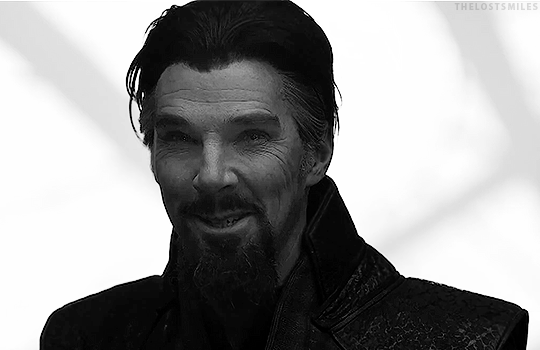
My brain felt fuzzy as I woke, trying to take in my surroundings.
“She’s waking up.” I heard Wanda’s voice… no, not Wanda… her. The witch. I wasn’t safe at home, sleeping in my bed. The arms around my body felt strange. They weren’t Loki’s. They weren’t home. I stirred, moving in the strange embrace, unsure of what… or who was holding me. My eyes fluttered open, locking onto the figure above me. Stephen Strange. Suddenly the memories fell into place. Wanda’s voice in my head, the eyes that were no longer hers. I stumbled away from Stephen, breathing heavily as I tried to get my bearings.
“Darling-.”
“Shut up!” I hissed, interrupting him.
Wanda was watching me carefully as I fought back my tears. “Did you let them go?” I asked her and she nodded.
“So long as you keep your end of the deal… they will remain unharmed.”
I nodded, sighing as I realized this was now my life. “Care to give me a tour?” I looked around. “This place looks different from the sanctum I’m familiar with.”
“I suppose that’s what happens when a world is destroyed,” he said sadly, looking around the crumbling sanctum.
“I want to rest… It's been ages since I’ve been able to sleep without being afraid.” In reality I wanted to sleep to try and communicate with my friends back home.
He seemed sad as he looked up at me. “You were afraid?”
I scoffed. “You manipulated my dreams… sent me to a dying universe. What did you expect?”
He said nothing; he simply signaled to Wanda to bring me upstairs.
She led me to a room that clearly belonged to someone else but I said nothing. I have to get home.
“Do you think… in time… you’ll learn to like it here?”
I looked up at the witch as she spoke, noting the dark circles under her eyes, the fear within them.
I shrugged. “Perhaps.”
The witch opened the door, leading me into an unfamiliar bedroom. “Stephen thought you might want your own room for a bit… to adjust. When you’re ready you’ll move into his room.”
“I’ll never be ready,” I spat.
I could see tears forming in her eyes and I sighed. “I’m sorry… it’s just… you have to understand how difficult this is for me. I left my home… my family… the man I love.”
She sighed.
“I loved him, Wanda. I get that that’s not what you want to hear but it’s true. I spent years running… trying to keep him safe, and we were finally back together. I get that you want me to fall in love with Stephen but I didn’t love him in my universe. Our relationship was simply that of a friend, nothing more.” My eyes lock with hers. “You chose the wrong Y/n. Out of all the options… why choose me? The one who wasn’t in love with any version of Stephen Strange?”
She smiled, seeming lost in the memory. “He knew it would be difficult… we looked for years… but of all the versions we found… you were the one we chose.”
“Why?”
She shrugged. “You were the one he fell in love with… and when I saw the way you protected the Wanda from your universe… it reminded me of our Y/n.”
“You know this can’t last… this universe won’t last forever. It’s crumbling around us.”
“Stephen is holding it together for now… and when the time comes… we’ll make a home somewhere else. We’re the Scarlet and Sapphire Witches. There’s nothing we can’t solve.”
“I’m not the Sapphire Witch!” I hiss.
She flinches and I take a breath, calming myself.
“I’d like to rest… alone.”
She nods and makes her way toward the door. “The door locks from the inside… you’re not a prisoner here.”
With that she leaves the room and I quickly lock the door behind her. I make my way toward the bed, crawling beneath the covers. Wind whipped against the windows before settling to a quiet hum and I closed my eyes, praying to whoever might be listening that I dreamed of something useful.
************
Taglist:
@nelachu2423
@purplekitten30
@lokisprettygirl22
@huntress-artemiss
@lokis-little-love
@lokis-tigress
@the-archangel-in-asgard
@crimson25
@thedistractedagglomeration
#loki x y/n#loki x reader#lokixreader#marvel mcu#marvel#loki x female reader#loki x you#loki laufeyson#loki odinson#mcu#the avengers x reader#avengers x you#avengers x reader#avengers au#mcu x reader
10 notes
·
View notes
Text
Pigment (Chapter 4)
Rise of the TMNT Post season 2, farmhouse arc Chapter 4 of a longer fic; THIS IS PART OF A SERIES - might be confusing to read without context
AO3
---
It takes him a full day.
Which, under any other circumstances, would be some cause for concern.
(Maybe it still should be.)
No one asked him to fix the lack of signal, but there's only so much internet deprivation (and his brothers' whining) he can take, and it seemed like an easy enough job, for the most part.
Leo told him once he was ''like a circus trainer of techbros'' – a sentiment Donnie didn't fully understand but appreciated either way.
He doesn't feel much like it today.
He's distracted and unfocused, his own skin and power foreign. There's a new kind of energy, pushing at his hands from under his skin like a current.
He finds himself holding back, pushing it down, like it might blow up in his own hands at any given moment.
It's overwhelming, and he's not used to it; to feeling this clumsy and useless, to the constant feeling of something pushing into the space between his ribs.
To finally realizing what Mikey must've felt all this time.
They're not talking about it, not really, not for now, and he's not planning on being the first one to bring it up.
(Sometimes, Donnie really wishes stubbornness didn't run so deep in their family.)
He spends the day locked in his room, tinkering away at scrap metal and loose parts, late into the night, before he finally gets it to work. Raph doesn't ask what he's doing.
It makes him feel bad in a way he doesn't quite know how to describe.
Now, he's sat on the roof of The Farmhouse, pushing in the last screws. The morning sun warms the back of his neck, and he wipes it with his hand, absentmindedly.
The dreadful heat and dry air (and possibly Donnie's rather visible nasty mood) firmly pushed all of his brothers into staying indoors for the morning. He tells himself that it will make it a nice surprise.
(And there's a small, selfish part of him that feels a little grateful for the moment of silence.)
Finally, he straightens, pulling out his phone.
He sits for a moment, watching the bars in the corner slowly fill up. There's a spark of satisfaction deep inside his gut, even if it feels more like finally guessing the right crossword answer than really solving anything.
Then – he dials the first number he can think of.
He chews at his nail absentmindedly, Kendra's obnoxious ringback tone blasting in his ear. He feels his tail shift up and down, beating against the roof tiles.
Finally, the song cuts off.
There's a shuffle, a strange noise, and then a quiet:
“Hello?”
Her voice makes Donnie still.
She sounds a bit muffled, like there's still something wrong with his machine (unlikely), or like she just woke up (probable).
He checks the time, just to make sure. It's noon.
“Hey,” he says. “It's me.”
“Yeah, I know it's you, dumbass, I've got your number saved.”
There's a rustle on the other side, her voice suddenly clearer.
It's the little shift in her tone – something unassuming and unnoticeable to others, that he's learned to read like a favorite book.
“You got my number?” He says, not trying to hide the smile that pushes into the corners of his mouth. “Wow, you're, like, obsessed with me or something?”
“You wish.”
It's an old song and dance, a familiar rhythm to fall into.
She's happy to hear him, and he knows it by the way the words fall out of her mouth, by the way she lowers her tone into that scratchy pitch.
And without any hesitation, he says:
“I do.”
It's raw and honest, not something he would’ve normally said in a moment like this, and he almost surprises himself with it.
But he missed her, and there's still a numb ache in his stomach, and he wants to hear the way her breath falters, for just a moment.
“Right,” she says. Then: “What's up?”
She sounds a little bitter, like she's mad at herself for not being able to find better words.
Sometimes, she sounds almost a little unnatural, like she wanted to say something else but changed her mind at the very last moment.
It's easy to spot after a while.
It's effortless to decipher when she occupies so many of his thoughts.
“Are you alright?” Donnie asks.
It's a question he already knows the answer to, at least in part. It's their first talk since everything, but texting her was the first thing he did that night at the hospital.
There was an unreasonable part of him that feared the worst, and an even stupider one – that only wanted to see the screen of his phone light up with notification.
“Jason started digging a bunker in the neighbors’ yard,” she says. “Mom already grounded him for it, tho.”
“Right.”
Donnie shifts, pulling his legs up to wrap his arm around his knees.
“So, about as good as I can be after... How did you say it?” Her mattress creaks a little. “After a sentient piece of armor, which may or may not have been your grand-something-father, demolished a few buildings?”
Donnie makes a sound, something between a whine and a drowning cat, his tail curling under his thigh.
“How about we don't talk about that?” He suggests.
On the other side, Kendra scoffs.
“That's not even the elephant in the room, Othello, that's a whole herd.”
Donnie winces.
He pulls his legs up higher, curling in on himself.
It's hot and humid, hard to breathe, and he can feel his skin grow sticky with sweat.
“I know, Kenny,” he murmurs, scratching at his leg with a claw. It leaves a pale mark. “Things are just really weird right now.”
“Well,” she says, “what's going on then?”
There must've been something rather pathetic in his voice, because her slight annoyance seems to ease.
He hates that.
There's a strange sort of carefulness his family treats him with nowadays, like he's a delicate machine, one step away from breaking down.
He's an older brother, he's their keeper, and he'd die for all of them – then, now, and always.
There's real concern and care in everything they do, in every 'are you okay?', in every careful gesture, in every soft whisper.
He just wishes he could see it as anything other than 'you used to be strong'.
“Mikey's being weird again,” he says, finally. “Weirder than usual. He's been fighting with Dad, and I don't know what to do with him anymore, he won't talk to me.”
“... Oh.” Kendra audibly shuffles in the place, like she wasn't really expecting him to answer, and he caught her off guard. “That's-”
“And Leo's acting like nothing happened, and that's even worse, honestly.” He runs a hand over his face, pushing sweat away from his eyes.
He sits up straighter, shifting in place. He pulls one leg close to his chest, claws digging into the skin on his knee, tracing the bone under it.
He started now, and suddenly he doesn't know how to push back the anger boiling inside of him. It's taking a lid off a pot – the steam hot, heavy, and spilling out everywhere.
“And I don't think Raph wants to be here. Which is stupid, because I know he doesn't want to be home either, so what's his issue?” It's mean and cruel, unfair and ignorant, and he hates that it's coming from him. “And then there's the whole thing with my aunt, and I don't even want to-”
He takes a breath.
It feels like running underwater.
It's strange, because he doesn't act like this, not like his brothers, but he's afraid if he doesn't get angry, he might do something stupid, like cry.
It lies on him like the skin of a stranger. He doesn't like it.
“I just want-” He stops for a moment, swallowing hard. “I want things to be normal.”
It's a lie.
He likes to imagine, sometimes, that there is a different world out there, somewhere, where he is young and small, and he's building towers out of blocks with Leo, lying down on the soft carpet of their living room.
Where Raph carries him on his shoulders when he's too short to reach the tallest shelves. Where Leo and Mikey are best friends more often than they are enemies. Where there are less lines aging Raph's face.
Where death is a thing that will never touch them, where life is an open road he'll never be scared to walk.
That, for what it's worth, is what he wants.
“Well,” she says after a beat. “I don't really know how to break it to you, but you kind of sound weird, too.”
That makes him pause.
He breathes, his skin rising and falling in goosebumps.
He takes a moment trying to decipher the tone of her voice, and it takes him far too long to realize she sounds timid.
Which is ridiculous, really.
His girl is bold and loud, unabashed and taking everything she wants in fistfuls, and Donnie would sooner bite off his own fingers than call her anything close to timid.
“What does that mean?” He asks, because he wants to know, and it sounds minutely better than 'Please, not you too'.
“I don't know.” There's a rustle on the other side, like she's shifting in place. Donnie can imagine her lying down on her bed, hair spilling onto her pillow. The color might be faded now; he can't imagine she found much time for haircare. “Is everything alright?”
“I just told you it wasn't.”
“Not with your family, idiot.” The way she says it makes it sound almost soft. “With you.”
Oh.
He takes a moment, considering.
There's a deep ache in his chest, like something cold and vile, filling up his lungs with fluid. He's numb in all the wrong ways – stiff and achy.
He flexes his fingers, claws dragging over calluses.
“Yes,” he says.
“Do not fucking lie to me.”
“Okay, no.” He raises a hand, running it over his face. “I don't know.”
Donnie, for all intents and purposes, is a man of logic.
Or: that's what he likes to tell himself.
His thoughts fall into his hands like bits of strings, and he follows them down, and up, and wherever else they lead him; straightforward line of thinking.
He's just not sure why he's now finding so many knots.
“What does that mean?” Kendra questions.
She sounds a little different now, not quite breathless but close, probably pacing around her room; whatever space she has left that's not currently occupied by electrical wires, machine parts and piles of everything metal and possibly flammable.
For a moment – he doesn't really know how to answer her.
It's stupid, and he feels like a fool for even bringing it up, like if he just turns the other way, all of these emotions will stop feeling so real.
It doesn't seem to be working so far.
He shifts his hand, rubbing at his chest. There's pressure building behind his eyes, and he feels dangerously close to clawing his own brain out.
“I don't feel like myself.”
For a moment, they're both silent.
Donnie watches the horizon, eyes and thoughts far away.
“Wow,” Kendra says finally, pronouncing every letter like its own sentence.
Donnie laughs, mostly to stop himself from doing anything worse.
“I know. I just-” He rubs his chest with a hand – an old, comforting habit. “I'm so stressed out, all the time. I don't know why, I just feel like something bad is going to happen, and then it doesn't, and somehow that makes it worse.”
It doesn't make sense, not even to his own ears.
He knows this place. He knows the people in it; he loves the people in it.
He loves every corner of this house, every sentimental object, every chipped plate, every dry spot on the grass.
Almost all the objects of his ceaseless affection – stuck between four walls.
And yet – he's a starved animal, aimless with want, and utterly, completely lost.
“... I don't know what to say,” Kendra tells him, almost apologetic.
“Me neither.”
He's been feeling death in every step, in every breath, in every layer of scars on his back.
He doesn't know how to convince himself it won't follow them here.
It's a knot in his stomach, a constant ring in his ears, a sudden squeeze of his hearts; it's loud and pushing into every corner of his mind.
He's a man of logic.
And that, as he's starting to realize, does not make him fearless.
“I'm sorry,” Kendra says.
He wishes she were here. It's a sappy and painfully sentimental thought, but he can't find it in himself to care anymore.
“I don't want to talk about this,” he decides.
“... Alright.”
For a moment, they're both quiet.
He's raw and vulnerable, shying away from the sting of a fresh wound.
Kendra seems just as lost as him, which feels like cheap consolation, all things considered.
“Can he talk about something else, please?” He asks, finally.
She doesn't answer right away.
He can imagine her twisting a strand of her hair around a finger – a nervous habit she never seemed quite aware of.
She's so pretty it hurts.
“You know,” she says, a little hesitant. “My dad's been asking about you.”
For a moment, Donnie falls silent.
“Really?” He says finally, not hiding his surprise.
Kendra's father was a man of few words and no nonsense – apparently all very desirable traits in a car mechanic.
His workshop was a building Donnie didn't dare to linger in uninvited, and a place of true machinery worship. Cars were complicated and wonderful creatures, and the presence of someone who handled them with such casual precision made him equally giddy and all kinds of nervous.
The excuse of waiting for Kendra gave him a few opportunities to try and show off, most of which were met with a vaguely pleased, slightly distracted nod.
For the most part, he counted that as a win.
“I wasn't sure he remembered I existed,” Donnie confesses.
“I know, me neither,” she says, so plainly it makes him laugh. “I think he likes you? In a way.”
“In a way?”
Donnie shifts, stretching out his legs. The skin under his knees feels sticky with sweat, his muscles stiff.
“Well, we're going out, so he can't like you too much, you know?” She says, like it's obvious and something he should already know.
“Sure,” he says, like it is.
“School's closed, and he's got...” She pauses for a moment, once again changing her mind at the last moment. “A lot of work. He's looking for free labor, basically.”
“And he wants my help?” He makes sure, still a little disbelieving.
There's a smile in her voice, a little teasing, a little sincere.
“Don't let that get into your head, kitten.”
“Do not call me that. I'll see what I can do.” He shifts, laying down flat on the roof; the sun-kissed tiles hot on his arms. “I have to ask Leo.”
“That's good. Go and talk to him, you-” She doesn't finish, suddenly silent. There's a creak on the other side, a soft voice, and then an exasperated: “What do you want? Get out of my room.”
“Is that Jason?”
Kendra's relationship with her brother stood firmly between a line of things he didn't fully understand but knew better than to question.
She doesn't answer him, seemingly too busy trying to close her bedroom door in her brother's face.
“No one, I'm not talking to anyone. It's not Donnie.” He can't make out Jason's response, but Kendra's voice raises a few pitches. “What do you mean I ''don't have any other friends''?” Donnie raises a fist to his mouth, biting on his knuckle to stop himself from laughing. “No, he doesn't want to look at your stupid project, right?”
It takes Donnie a moment to realize she's talking to him now.
He's not sure he'd call Jason a friend – a privilege reserved for only a selected few. But there's energy to him, some kind of spark on his face that painfully reminds Donnie of his own little brothers, and he finds it hard to tell him no.
“I can look at it,” he says.
She doesn't seem happy with that.
“Oh my God, you're useless. No, not- You know what, yes, you too.”
Donnie listens to them bicker for a moment longer before the door finally slams shut. Kendra swears under her breath, something loud and crude, and rather impressive.
“Younger brothers, am I right?” Donnie jokes.
Kendra sighs, her voice a little breathless:
“Shut up.”
***
He finds Leo and Mikey in the living room.
They're occupying the whole couch – loud and larger than life, and always in need to show it. There's a metal box balanced on Leo's lap, and he's hunched over, his hands busy with something.
It's strangely rare to see the two of them together in relative peace, and it makes Donnie pause for a moment.
They're like water and oil, or a chemical reaction, and Donnie can never be sure what kind of experiment he will get on any given day.
He feels like he missed something – some big, important shift that made his little brothers like this – angry and starved. It's tough love, affection that comes with rough words and biting where it'll hurt, and the kind of loyalty that turns a wolf into a hound.
He feels like he's still missing the parts that make Leo and Mikey seem okay with all of this.
Leo looks up when he hears Donnie enter, leftover laughter spread across his face.
His smile drops the moment their eyes meet.
Donnie's not sure what his face looks like, but whatever it is, it makes Leo frown.
“What happened?” He asks. Then, a little less kindly: “What is wrong with your face?”
“Nothing,” Donnie answers. Then, a little less honest: “Everything is fine.”
Leo's expression hardens, and he squints a little, like he's thinking deeply and trying not to show it.
Donnie raises his arms in something like a shrug, then lets them fall to his side again.
“I don't know what you want from me,” he says.
Rather unsubtly – Mikey nudges Leo's thigh. He glances at Donnie, then again at Leo, his face unreadable.
It's strange, knowing they're talking about him in a way he can't understand, and it makes Donnie feel sticky all over.
Leo's gaze softens, just a little.
“I mean, you can't be worse than Mikey.” Leo leans forward, lowering his voice to a very considerate whisper-shout. “I saw him talking to a wall earlier.”
Mikey stills, just for a moment, before laughing – that breathless, strange thing.
“I was not.”
“You totally were. You're such a weirdo, man.”
Leo's grinning, and then he's not, his face changing to something a little more serious, just for a moment. Donnie knows how concern looks on Leo, even when hidden under layers and layers of good humor and lightheartedness.
He feels scattered, a little too distracted to take this in right now, but he still feels his mouth pull into a thin, worried line.
He knows this is no different than Mikey's and Leo's silent exchange.
He's a hypocrite at heart.
Mikey huffs, sitting up straighter.
“I was thinking out loud.” He puts a finger to the side of his head. “Thinking. You should try it.”
Sometimes, Donnie feels like all the problems in his life stem from having brothers. This will age him thirty years.
“Are you two going to fight?” He asks, voice tired. “I'm leaving if you're going to fight.”
Mikey looks at him like he's being difficult on purpose, then tilts his head to add more flair to his sigh.
“Oh, man,” he says, dragging out each word, “whatever.”
Leo gives him a strangely apologetic look. He reaches to pat the couch next to himself, moving to the side (and making sure to sit down on Mikey's foot in the process).
Donnie hesitates, just for a moment, before walking up.
He curls his legs close to his chest when he sits, tired and aching from the sun. He wants to grab Leo's arm, too – something warm and familiar to hold onto, but the bright fabric in his brother's hands makes him frown.
“What are you doing?”
Leo grins, something a little more honest.
He holds up the fabric, presenting it in all its frayed-edge, crooked glory.
“I'm making a mask for Angelo,” he says, pointing at his face. “Like we have. Want me to make you one, too?”
It's an odd gesture.
It's so sweet and unexpected, honest and a little vulnerable, and it makes Donnie's hearts ache.
He wants to grab Leo's shoulder, then hesitates, then does it anyway – an awkward and clumsy gesture.
Leo blinks a little, reaching out a hand to cover Donnie's.
“Are you-”
“Yeah.” Donnie turns his head, hiding his face in his shoulder. “I want one.” He's already half broken, and he feels a push away from screaming, or worse – crying. “Are you into sewing now?”
He doesn't mean to mock, but he's desperate for any kind of distraction.
He must look pathetic.
Mikey and Leo share a look.
“Hey, Dee?” Mikey asks, hesitant.
He reaches for Donnie's hand on Leo's shoulder, taking it into his. He pulls it closer, curling Donnie's fingers into his throat, resting his chin on his knuckles.
There's a strange look on his face – worry, for sure. And something else, something a little distant, something that always makes him seem miles away, even when Donnie can feel his every word.
“Thanks for fixing the signal,” he says.
I didn't tell you that, Donnie thinks.
He feels his mouth tighten.
“Not like it's hard,” he says, because if he doesn't, he might say something worse.
Mikey tilts his head a little.
That jacket is too big for him.
He looks small.
“You make it look easy.”
He says it like it's supposed to mean a million different things.
Donnie doesn't understand any of them.
5 notes
·
View notes
Text

NASA's IXPE reveals X-ray-generating particles in black hole jets
The blazar BL Lacertae, a supermassive black hole surrounded by a bright disk and jets oriented toward Earth, provided scientists with a unique opportunity to answer a longstanding question: How are X-rays generated in extreme environments like this?
NASA's IXPE (Imaging X-ray Polarimetry Explorer) collaborated with radio and optical telescopes to find answers. The results, available on the arXiv preprint server and set to be published in the journal Astrophysical Journal Letters, show that interactions between fast-moving electrons and particles of light, called photons, must lead to this X-ray emission.
Scientists had two competing possible explanations for the X-rays, one involving protons and one involving electrons. Each of these mechanisms would have a different signature in the polarization of X-ray light. Polarization is a property of light that describes the average direction of the electromagnetic waves that make up light.
If the X-rays in a black hole's jets are highly polarized, that would mean that the X-rays are produced by protons gyrating in the magnetic field of the jet or protons interacting with the jet's photons. If the X-rays have a lower polarization degree, it would suggest that electron-photon interactions lead to X-ray production.
IXPE, which launched Dec. 9, 2021, is the only satellite flying today that can make such a polarization measurement.
"This was one of the biggest mysteries about supermassive black hole jets," said Iván Agudo, lead author of the study and astronomer at the Instituto de Astrofísica de Andalucía—CSIC in Spain. "And IXPE, with the help of a number of supporting ground-based telescopes, finally provided us with the tools to solve it."
Astronomers found that electrons must be the culprits through a process called Compton Scattering. Compton scattering (or the Compton effect) happens when a photon loses or gains energy after interacting with a charged particle, usually an electron. Within jets from supermassive black holes, electrons move near the speed of light. IXPE helped scientists learn that, in the case of a blazar jet, the electrons have enough energy to scatter photons of infrared light up to X-ray wavelengths.
BL Lacertae (BL Lac for short) is one of the first blazars ever discovered, originally thought to be a variable star in the Lacerta constellation. IXPE observed BL Lac at the end of November 2023 for seven days along with several ground-based telescopes measuring optical and radio polarization at the same time. While IXPE observed BL Lac in the past, this observation was special. Coincidentally, during the X-ray polarization observations, the optical polarization of BL Lac reached a high number: 47.5%.
"This was not only the most polarized BL Lac has been in the past 30 years, this is the most polarized any blazar has ever been observed," said Ioannis Liodakis, one of the primary authors of the study and astrophysicist at the Institute of Astrophysics—FORTH in Greece.
IXPE found the X-rays were far less polarized than the optical light. The team was not able to measure a strong polarization signal and determined that the X-rays cannot be more polarized than 7.6%. This proved that electrons interacting with photons, via the Compton effect, must explain the X-rays.
"The fact that optical polarization was so much higher than in the X-rays can only be explained by Compton scattering," said Steven Ehlert, project scientist for IXPE and astronomer at the Marshall Space Flight Center.
"IXPE has managed to solve another black hole mystery," said Enrico Costa, astrophysicist in Rome at the Istituto di Astrofísica e Planetologia Spaziali of the Istituto Nazionale di Astrofísica. Costa is one of the scientists who conceived this experiment and proposed it to NASA 10 years ago, under the leadership of Martin Weisskopf, IXPE's first principal investigator.
"IXPE's polarized X-ray vision has solved several long-lasting mysteries, and this is one of the most important. In some other cases, IXPE results have challenged consolidated opinions and opened new enigmas, but this is how science works and, for sure, IXPE is doing very good science."
What's next for the blazar research?
"One thing we'll want to do is try to find as many of these as possible," Ehlert said. "Blazars change quite a bit with time and are full of surprises."
IMAGE: This artist’s concept depicts the central region of the blazar BL Lacertae, a supermassive black hole surrounded by a bright disk and a jet oriented toward Earth. Credit: NASA/Pablo Garcia
6 notes
·
View notes
Text
you’re a puzzle i want to get lost in for hours, scouring for the final piece that will complete the scenic masterpiece. you’re a hedge maze in my lavish garden, and i keep going in the wrong direction, stuck in an endless cycle, wondering if i will ever make it out. you’re a mystery i’ve been trying to solve for years now. and a case that had once gone cold has reemerged again. how did i find myself back here, circling your orbit like a satellite? reading into every word you write, every laugh you give to one of my jokes, and every mixed signal you send? history would suggest that when we parted ways the first time, it would have been final. it should have been final but here we are learning to enjoy one’s company, and be in each other’s lives even if it’s just as friends. and then again, here i am. trying to solve the case, lost in the maze, and searching for the piece that will finally *click*
3 notes
·
View notes
Text
How Unmanaged ADHD Almost Killed Half the Universe: A Peter Quill Character Analysis
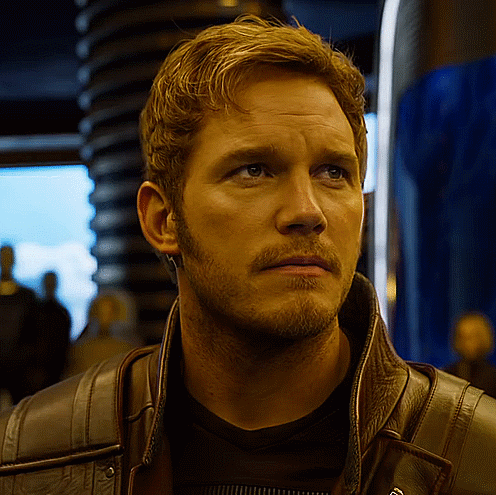
First, a disclaimer: I'm not a professional anything. I genuinely don’t even know how to use Tumblr but I needed somewhere to get weird about my hyperfixations where the normies can’t see. 😅 I can't diagnose anyone with anything, and I'm not saying that Peter Quill was written as an intentional representation of ADHD. I am just a person who was diagnosed in adulthood with ADHD who loves and relates to Peter Quill. This is just my interpretation of him through the lens of my own experiences. Also, this is (hyper)focused on the MCU version of the character.
Impulsivity, Risk Taking, and Emotional Dysregulation
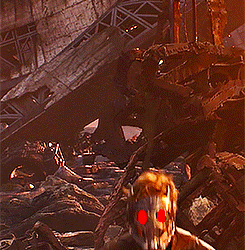
Ok, so this is the big one. We know that Peter has massive impulsivity issues. This is how to works in an ADHD brain (from additudemag.com): "The thalamus area of the brain controls response inhibition. It works like a gate — sending signals to allow or stop behaviors. When the brain detects a red flag, its limbic-hippocampal connections relay a warning from the thalamus to the frontal cortex. That’s the control center of the brain that handles emotional expression and problem solving. In ADHD brains, the thalamus gate is broken." So let's look at some examples by movie.
Vol. 1
He goes back for his walkman when it's been stolen from him at the Kyln, even though they're currently breaking out of a high security prison because of an impulsive, emotional reaction. He also gives Gamora his mask when she's floating out in space, with the hope that calling Yondu will also save him (impulsivity involves a lack of foresight). His bragging about how selfless it was afterwards to Gamora came across as arrogant, but it was probably also him realizing himself that things could have gone very differently because people with ADHD don't tend to think ahead. Finally, he banks on his 12% of a plan being enough to defeat Ronin. Peter thinks ahead *just* enough but struggles to see things through to completion. And then at the end he just does the first things he can think to do - a dance off and then grabbing the same stone that he had just watched tear a woman apart.
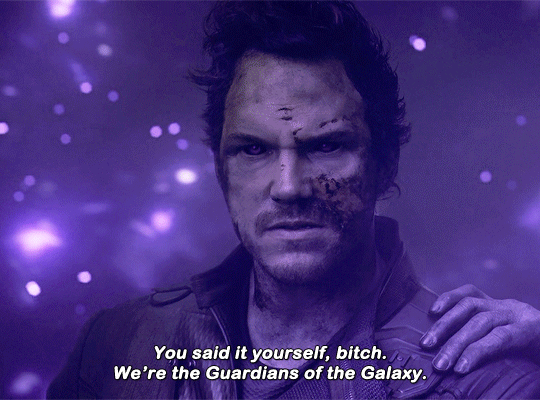
Vol. 2
When he learns that Ego killed his mother, his anger completely overtakes him and he shoots his father immediately, once again reacting emotionally and impulsively.
Infinity War
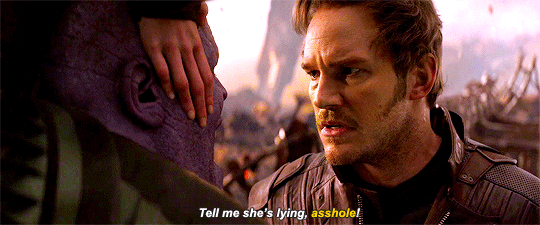
This is the one that hurts, because it shows how devastating unmanaged ADHD symptoms can be. When he learns that Thanos killed Gamora, he literally can't control his emotions because his brain doesn't work that way and he's never had the tools to manage it, and he impulsively beats Thanos without any thought for the consequences. It always broke my heart to see him villainized for this because I knew it would be my exact reaction in his shoes. Peter always acts from his heart, for better or worse, and in that moment, his pain overwhelmed any logical thought. As an aside, I've found that this is one of the hardest parts of being late-diagnosed. You look back on all the times where you can't quite explain rationally why you did the thing you did and start to understand why and there’s a whole lot of shame involved in it (more on shame later!)
Vol. 3
"Kill them all" Peter spends an entire scene telling Drax they're not going to kill anyone, because that's who Peter Quill is. He's compassionate and empathetic, but once he gets angry, once he's hurt, all that goes out the window. Literally! He grabs Theel and jumps out of the window towards a dying planet! People with ADHD tend to have low frustration tolerance, impatience, a hot temper, and excitability. So, in addition to jumping into an exploding planet...
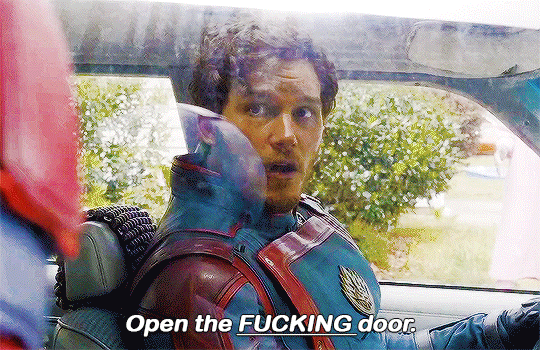
Forgetfulness, Music, and Dopamine Hunting
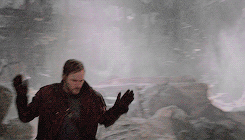
Because the reward center doesn't produce enough dopamine in the ADHD brain, boring tasks like cleaning are painful. Our brains don't give us any sort of satisfaction for doing it, so there's very little motivation to do it. The Milano is a mess, of course it is! Cleaning isn't interesting or rewarding and even if we want to live in a clean environment, we're constantly at war with our own brain over having to make it that way. When he gets back from Morag, he's forgotten Bereet's even THERE. People with ADHD struggle with their working memory, meaning that if a thing isn't right in front of them, they tend to forget about it. We also know that Quill's a bit of a womanizer, and that impulsive, pleasure seeking behavior is one of the ways that people with ADHD try to up their dopamine levels. People with ADHD tend to have issues with alcohol and drug abuse as well, since they stimulate the pleasure center of the brain, and we know that Peter uses alcohol heavily to cope after losing Gamora.
Speaking of the pleasure center of the brain, music triggers it, and we know my guy cannot do anything without music on. And for most of his life it was the SAME 12 SONGS (hyperfixation?). Not only that, but familiar music (or tv shows, or movies) can provide a sort of white noise that let's people with ADHD focus better. Peter loves music because it reminds him of his mom, sure, but also because it helps him get shit done because otherwise his thoughts would be all over the place in silence. Plus dancing is a great way to stim and get that extra energy out.
Masking, Rejection and Identity
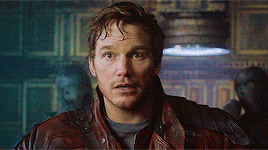
People with ADHD also often deal with Rejection Sensitivity Disorder, where they are extra sensitive to real or imagined rejection. We don't see *too* much of this, but there are hints of it. Like his interpretation of the night his mother died. His grandfather carried him out of the room to protect him, but he interpreted it as getting thrown out. He took Yondu's joking about wanting to eat him literally. He panics at the idea that Gamora might be rejecting him for Thor (who is, as everyone points out to him, the real version of the person he pretends to be). He also can't accept the Other Gamora's rejection of him. Part of the way he protects himself is by creating a persona that can handle rejection.
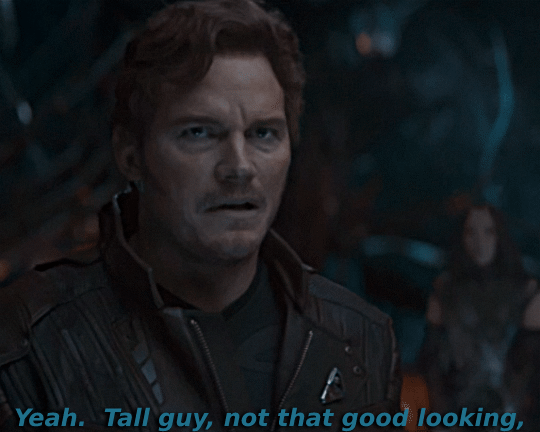
Masking is more commonly associated with ASD than ADHD, but people with ADHD can still mask to try to hide their ADHD symptoms. And truthfully, if you're a human kid trying to survive around a bunch of aliens, the only hope you've got is to try to fit in anyway. Peter's entire persona is what he *thinks* a cool space pirate should be like. He creates this Star-lord persona based on his heros growing up. But where Han Solo is genuine in his confidence and swagger, with Quill, it's an act. He's a sensitive, emotional kid that had to develop this mask to survive being raised by the Ravagers. It crumbles when he meets Thor and sees himself next to the sort of person he's trying to be and just how insecure Peter is. And we see over and over again that he's most successful when he lets the mask drop and leads with empathy and compassion. Every single Guardian started as his enemy, but Peter, unlike Han, doesn't shoot first. At his core, he is still that little boy who got into a fight with the other kids for killing an innocent frog. A lot of people with ADHD feel stuck in arrested development and Peter Quill is still a kid playing pretend in a lot of ways.
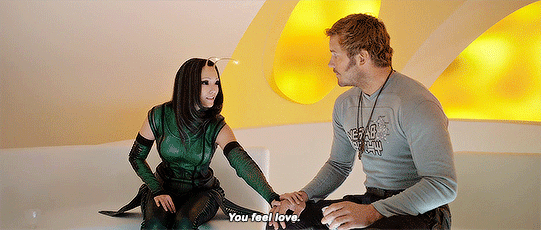
I think Quill is a much more layered and interesting character than people tend to give him credit for because he masks TOO well. People look at him and see a boring white dude. Handsome and confident just like all of the other MCU leading men...but it's because that's what he wants you to see. Because if you saw what a mess he was underneath all of that you'd understand why his family are these other neurodivergent weirdos. He might be pretending to be "Star-lord", but there's a reason his best friends are Rocket and Drax.

I think the heartbreak of Vol. 3 is that he had started to figure out who he was with Gamora because she grounded him but he wound up tying too much of that progress to her. He can't go back to the person he was (Legendary Outlaw Star-lord) because that was never truly him, and facing the world without that safety net is too hard. So he chases the dopamine. He drinks, he tries to convince the other Gamora to be with him, he even briefly turns to Nebula, because he's never really had to face himself. Mantis says that Drax is the only one of the Guardians who doesn't hate himself, and in spite of his outward confidence, I think that includes Peter. Peter loves the Outlaw Star-lord persona, he loves the Guardian Star-lord he became with Gamora, but deep down, he's sensitive and driven by emotions he can't control and he's ashamed of that. Remember, he was raised by Yondu who constantly derided him for his sentimentality and he was blamed for the Blip because of an emotional reaction he didn't have the tools to control. The qualities that helped him create a family out of a group of criminals are the same ones that cause him to screw up and cause him shame. Which is pretty much what having ADHD can feel like.

So there is is! I'm sure I've missed stuff and some of this is just character analysis regardless of ADHD, but there it is. Also, definitely check out @peter-quill-is-so-fine ‘s breakdown of Quill's report card that inspired all this for further evidence.
45 notes
·
View notes
Text
Mint Reviews: Eureka Investigative Urban Fantasy, by @anim-ttrpgs
The following is a review for Eureka: Investigative Urban Fantasy, a game currently in playtesting, set to be put up onto Kickstarter later this year. I received the playtest copy of the game in exchange for this review.

Eureka is a game about solving mysteries in an urban fantasy setting. It's meant to be dangerous and constantly keeping you guessing. The copy that I reviewed is a playtest copy, which is important to keep in mind for two reasons. One, because I was reviewing it before it's been subjected to proper layout, and addition of art. Two, because there may be changes to the game that alter the play experience that I would be expecting from this initial read-through. I certainly expect the authors to change or include new things before releasing the final version.
The mechanics of Eureka centre on rolling 2d6 and adding a modifier somewhere between -3 and +3. Your result will be one of three options: a Full Success, a Partial Success, or a Failure. Characters are made up of composite parts: you will have traits that give your character modifiers or special abilities, as well as two different health tracks, an Investigation Points Track, character morale/composure, and a list of gear.
Some of the central mechanics outside of the graded success of action roles involve Character Truths and the Investigation Track. Character Truths are personality quirks that tell you something core to your investigator, and reward role-play that is true to the character even if strategically it's a bad option.
As your characters look for clues, they will collect Investigation points every time they uncover a clue or fail a roll. Once they fill their Investigation track, they get something called a Eureka - a resource that gives the player the chance to tilt the narrative in their favour.
Damage in this game is layered: your characters have Superficial HP, and Penetrative HP. These tracks work interdependently of each-other, with Superficial HP bleeding into Penetrative HP if it fills up first. If you are familiar with the bashing damage and lethal damage of World of Darkness games, this system should be very familiar.
Stars:
The setting is very interesting and flexible, which means that if your group is very interested in urban fantasy, but you don't want to learn all of the big systems out there, Eureka is an option that only requires you to learn one system.
The game is designed to elevate suspense; the GM and the players are encouraged to keep secrets from each-other, and combat is often lethal.
The Woo Roll: a mechanic in gun combat that gives your characters some interesting moments when shooting a gun: after all, bullets don't just hit people, they also hit leaking pipes, fire extinguishers, innocent bystanders....
Wishes:
This game has a lot of rules (which is not necessarily a bad thing). There are three chapters dedicated to different kinds of combat and 2-3 chapters that need to be read to understand how characters work. As a result, however, I wish there was an index, to make finding pieces of information easier.
I wish there were more safety tools available in this game. I'm in the camp of preferring safety tools regardless of table or genre, but especially in horror games and games with suspense, there are elements of Eureka that could very easily trouble players who don't know what they've signed up for. The game encourages players to keep secrets from each-other, and prompts the GM to surprise the players with the kinds of horror that could be just around the corner. This isn't to say that a horror game shouldn't have some kind of surprise involved, but having a detailed Session 0 to talk about what is or is not on the table for everyone involved, as well as a method to signal that something in game is crossing Lines, would go so far here.
There are recommendations about what the characters should avoid playing (cops, FBI agents, etc.), but I found very little guidance about what kinds of characters should consider. I'd have loved to see some pre-generated suggestions for reasons as to why the characters are working together, especially because players are asked to create characters that want to work together, not characters that are ready to fight each-other given the opportunity.
Other Notes:
This is not Powered by the Apocalypse, and I think it's important to recognize that if you're thinking about buying Eureka. The rolls take inspiration from many PbtA games in that you roll 2d6 and get a staggered success, but the game is not designed for generative play. PbtA games ask you to play to find out what happens, but Eureka is designed to run pre-written modules, where the clues are thought of beforehand and the answers have already been determined. I read the dice rules and thought this game was PbtA, but once I saw the detail to which the authors explained how to use skills and handle combat, I felt like this game was actually closer to something like Chronicles of Darkness.
This game requires a lot of preparation, especially for the GM. If you are running this game, you will need to co-ordinate the character creation for each player separately, as the game recommends that the players not know what is going on inside other character sheets. It also requires you to convert the NPCs and villains from other adventures into Eureka's stats, because NPCs in this game roll just like PCs do.
This game lives on secrets. There are fantastical options in this game but the author recommends that the GM keeps much of the magical elements secret from the players. If there is a monstrous character, they are expected to keep that secret even from other players at the table - at least until a dramatically appropriate moment.
For me, I don't think I am the target audience for Eureka. There is a lot of guidance in this book for specific situations and expected problems at the table, which might be helpful for GMs that prefer planning to improv or for GMs that are unsure about how to adjudicate certain questions at the table. However, I feel like the 2d6 mechanic feels so close to PbtA for me that I think I would have a hard time separating my play patterns cultivated from PbtA play in order to run this game the way I would run a game like Chronicles of Darkness.
I understand why pvp conflict in a horror game might not be what the party wants, especially if the entire group needs to be on the same page to defeat a larger horror, but if the characters are discovering as they play that one of them is using very different talents and skills, the response to react with distrust or hostility is a very likely event - and the lack of moves to play through interesting character conflicts would make resolving those reactions very tricky for me.
Conclusion
If you are interested in games that encourage secret keeping and hidden agendas, and if you like games with a bit of crunch and freedom to character creation, Eureka might be worth checking out. If you prefer Powered-by-the-Apocalypse style games that focus on generative play, I recommend looking at something a little different.
42 notes
·
View notes